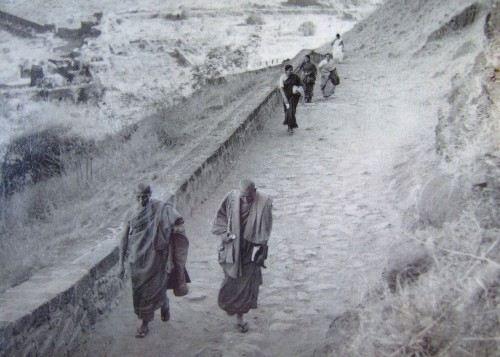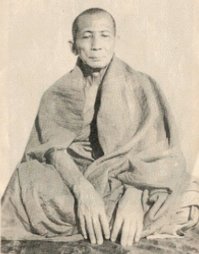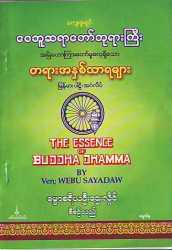သူေတာင္းစားႏွင့္ဘုန္းႀကီး

ဆရာေတာ္အစဥၤအဆက္ဆက္ ေျပာျပခဲ့တဲ့ ဓမၼပံု၀တၳဳေလးတစ္ပုဒ္ကို အရင္ေျပာျပရေအာင္ပါ။
တစ္ခါတုန္းကဘုန္းၾကီးေက်ာင္းတစ္ေက်ာင္းကိုသူေတာင္စားတစ္ေယာက္ ေရာက္လာပါ တယ္။ ေက်ာင္းေပၚေရာက္ေတာ့ ေက်ာင္းထိုင္ဘုန္းၾကီးကို အသင့္ေတြ႔တာနဲ႔ ”ဘုန္းၾကီးဘုရား.. ဆြမ္းက်န္ကြမ္းက်န္ေလးမ်ားရွိရင္ စြန္႔ပါဘုရား” လို႔ေလွ်ာက္လိုက္ပါတယ္။
ဒီေတာ့ ေက်ာင္းထိုင္ဘုန္းၾကီးက ” မင္းမွာ ေျခေကာ လက္ေကာ အေကာင္းၾကီး၊ ကိုယ့္ဟာကိုယ္ လုပ္စားပါလား၊ ဘာျဖစ္လို႔ ေတာင္းစားေနရတာလဲ၊ သြား မေပးႏိုင္ဘူး၊ အခုဆင္းသြား” လို႔ ခပ္ေငါက္ေငါက္ေလး ေျပာလိုက္ပါတယ္။
(more…)
အရွင္ရာဇိႏၵ (ရေ၀ႏြယ္ အင္းမ) Ya Wai Nwe (InnMa)

I was born on the 18th of June, 1969 at Inn Ma city, The’ Kone, Bago Division. My parents are U Thein Ni Sein and Daw Kyin Nu. At the age of ten, it was time for me to be a novist. A year after that, I became a novist again then, titled as A Shin Ra Zhane Da. At the age of 20, I became a honorific monk (ya hen).
I finished Pa Htar Ma Gyi Htan in 1990 at Ma Har We Thoe Thar Yone Parli University, Shwe Kyin monastery, Yangon. I later acquired the title of Thar Dana Da Sar Da Mar Seri Ya in 2000. It took me 10 years to finish Da Ma Sa Thi Ya Tan.
(more…)
ေ၀ဘူ ဆရာေတာ္ဘုရားႀကီး ေဟာၾကားေတာ္ မူေလ့ ႐ွိေသာ တရား အႏွစ္သာရမ်ား (The Essence of Buddha Dhamma)

ေ၀ဘူဆရာေတာ္ဘုရားႀကီးေဟာၾကားေတာ္မူေလ့႐ွိေသာ တရားအႏွစ္သာရမ်ား
သီလ ေဆာက္တည္ၿပီးလွ်င္ ျပည့္စံုေအာင္ ျဖည့္ၾက၊ ျဖည့္လို႔ ျပည့္စံုၿပီ ဆိုလွ်င္ မိမိစိတ္အလို ေတာင့္တတဲ့အတိုင္း ၿပီးမယ္၊ ယခုလည္း ခ်မ္းသာမယ္၊ ေနာင္လည္း ခ်မ္းသာမယ္။
ပစၥဳပၸန္ ခ်မ္းသာ၊ သံသရာ ခ်မ္းသာ ၂-ျဖာကို ေပးစြမ္းႏိုင္တာဟာ ဘုရားရွင္ အဆံုးအမေတာ္က လြဲလို႔ တျခားမရွိဘူး။
ဘုရားရွင္ အဆံုးအမဆိုတာ ပိဋက ၃-ပံုပဲ၊ ပိဋက ၃-ပံု ဆိုတာ အလြန္ က်ယ္၀န္းတယ္။
ပိဋက ၃-ပံုကို အဆီ ထုတ္ပါလွ်င္ “ေဗာဓိပကၡိယ ၃၇-ပါး” ရတယ္၊ ေဗာဓိပကၡယ တရား ၃၇-ပါးကို အဆီ ထုတ္လွ်င္ “မဂၢင္ရွစ္ပါး” ရတယ္။ မဂၢင္ ရွစ္ပါးကို အဆီထုတ္လွ်င္ “သိကၡာ သံုးပါး” ရတယ္။
(more…)
ေက်းဇူးရွင္ ေ၀ဘူဆရာေတာ္ဘုရားၾကီး၏ ေထရုပတၱိ အက်ဥ္း
Ven. Webu Sayadaw (1896 -1977)
 Ven. Webu Sayadaw was one of the most highly respected monks of this century in Burma. He was notable in giving all importance to diligent practice rather than to scholastic achievement. Webu Sayadaw was born in the village of Lngyinpin in upper Burma on 17 February 1896. He underwent the usual monk’s training in the Pali scriptures from the age of nine, when he became a novice, until he was twenty-seven. In 1923 (seven years after his ordination), he left the monastery and spent four years in solitude. He practiced (and later taught) the technique of Anapana-sati (awareness of the in-breath and out-breath). He said that by working with this practice to a very deep level of concentration, one is able to develop Vipassana (insight) into the essential characteristics of all experience: anicca (impermanence), anatta (egolessness) and dukkha (unsatisfactoriness). Webu Sayadaw was famous for his unflagging diligence in meditation and for spending most of his time in solitude. He was reputed to be an arahant (fully enlightened one), and it is said that he never slept.
Ven. Webu Sayadaw was one of the most highly respected monks of this century in Burma. He was notable in giving all importance to diligent practice rather than to scholastic achievement. Webu Sayadaw was born in the village of Lngyinpin in upper Burma on 17 February 1896. He underwent the usual monk’s training in the Pali scriptures from the age of nine, when he became a novice, until he was twenty-seven. In 1923 (seven years after his ordination), he left the monastery and spent four years in solitude. He practiced (and later taught) the technique of Anapana-sati (awareness of the in-breath and out-breath). He said that by working with this practice to a very deep level of concentration, one is able to develop Vipassana (insight) into the essential characteristics of all experience: anicca (impermanence), anatta (egolessness) and dukkha (unsatisfactoriness). Webu Sayadaw was famous for his unflagging diligence in meditation and for spending most of his time in solitude. He was reputed to be an arahant (fully enlightened one), and it is said that he never slept.
For the first fifty-seven years of his life, Webu Sayadaw stayed in upper Burma, dividing his time among three meditation centres in a small area. After his first trip to Rangoon, at the invitation of Sayagyi U Ba Khin, in 1953, he included southern Burma in his travels, visiting there to teach and meditate from time to time. He also went on pilgrimage to India and Sri Lanka. Webu Sayadaw spent his final days at the meditation centre in the village where he was born. He passed away on 26 June 1977, at the age of eighty-one.

ဆရာေတာ္ေလာင္းလ်ာမွာအင္းႀကင္ပင္ရြာ-ဦးလူေဖ၊ေဒၚႀကင္ႏုတို ့မွ ၁၂၅၇ ခုႏွစ္တေပါင္း
လဆန္း၆ရက္ တနင္လာေန. နံနက္ ေလးခ်က္တီးေက်ာ္ေမြးဖြားခဲ.သည္။ ေက်းလက္ေတာ
ရြာတြင္ကံက ပစ္ခ်ခဲ.ေသာ္လည္း ဆရာေတာ္ကားမင္းေဆြစိုးမ်ုိဳးၿဖစ္ဧ။္။ ဆရာေတာ္ဧ။္ အဘြား
(ဦးလူေဖဧ။္မိခင္)ကား အိမ္ေရွ့စံမိဖုရား တစ္ပါးၿဖစ္ဧ။္။ ခင္ခင္ဟုေခၚသည္။ ဆရာေတာ္ဧ။္
အဘိုးဦးကူးကားဘ႑၀န္ၿဖစ္သည္။ယခုအင္းႀကင္ပင္ေၿမာက္ဘက္ ေက်ာင္းႀကီးဒကာၿဖစ္သည္။
၁၂၇၇ ခုႏွစ္တြင္ရဟန္းၿဖစ္၍ ၁၂၈၀-၈၁ ခုႏွစ္မ်ား မန္းတေလးမစိုးရိမ္ဆရာေတာ္ အဘိစဇ
မဟာရဠဂုရု ထံပညာသင္ႀကားခဲ.ဧ။္။ ၁၂၈၅ ခုႏွစ္အထိ အင္ႀကင္ပင္ေက်ာင္းတြင္ပင္ ေနၿပီး
ထိုႏွစ္နယုန္လ ေတာထြက္ေတာ္မူသည္။
မယ္ေတာ္ႀကီးေဒၚႀကင္ႏုမွာ ေက်ာင္းပြဲဘုရားပြဲရွိတုိင္း ေတာင္ေ၀ွးတစ္ေခ်ာင္းၿဖစ္ ေက်ာင္းသို.
လာရာ လာတိုင္းပင္ ငို္၍ၿပန္ရဧ။္။ သတင္းအစအနမွ် စုံစမ္းမရသၿဖင္. တစ္ႏွစ္အႀကာ သား
ေသာကၿဖင္.ပင္ ကြယ္လြန္ရရွာဧ။္။

၁၂၈၅ ခုႏွစ္တစ္၀ါ ေရႊဘုိၿမိဳ. ပုသိမ္ေတာရ ဆရာေတာ္ထံေန၍ ၀ါကြၽတ္လွ်င္ မင္းဘူး ေရႊစက္
ေတာ္မွစ၍ ေတာေတာင္အႏွံ. ႀကြေရာက္ေတာ္မူသည္။ ထိုႏွစ္ကုန္ခါနီးမွာပင္ ေက်ာက္ဆည္
ေ၀ဘူလေတာင္၀ွမ္း အဂၤလိ္ပ္သခၤ်ိုဳင္းအနီးရွိ လွ်ိဳေၿမာင္အႀကားတြင္ သီတင္းသုံးဧ။္။ ေက်ာက္
ဂူတစ္ခုလည္းရွိသည္။ တစ္ေန.ေသာအခါ ဟင္းရြက္ခူး ထင္းေခြသူမ်ားက ဂူထဲတြင္ မက်န္း
မာ၍ လဲေနသည္ကို ေတြ.ရမွာအစ ေဆး၀ါးကုသကာ ဆန္စက္သူေဌးဦးေပ်ာ.က ေန.ခ်င္းၿပီး
ေက်ာင္းငယ္တစ္ေဆာင္ ေဆာက္လွဴကိုးကြယ္သည္။
ေက်ာင္းေဆာက္လွဴရန္ ေလွ်ာက္ေသာ္လည္း ခုႏွစ္ရက္တိုင္တိုင္ခြင္.မၿပဳ ကပ္မိုးကပ္ကာႏွစ္ခန္း
ေက်ာင္းကေလးေဆာက္လွဴၿပီးေသာ္လည္း အရက္ႏွစ္ဆယ္ခန္. ေက်ာင္းဒကာအား စကားမေၿပာ။
တို.မ်ားကိစၥမၿပီးခင္ လူေတြက ၀ိိုင္းအုံလိုက္ေနလို. ပုန္းစရာေတာင္ မရွိေတာ.ဘူးဟု မိန္.ေတာ္မူဧ။္။

ထိုေတာထြက္ေသာ ႏွစ္၊လ၊ပိုင္း အတြင္းတြင္ပင္ တတိယအဆင္.အထိၿပီးစီးေတာ္မူဟန္ရွိသည္။
အဲဒါေတာ. မႀကာဘူးဟဲ. ဟူ၍သာ မိန္.ေတာ္မူဧ။္။အနာဂမ္အၿဖစ္ႏွင္.ကား ႏွစ္ေပါင္းမ်ာစြာ ႀကာလြန္
ေနရဟန္ တူေလသည္။ အဘိညာဥ္ ကိစၥမ်ားလည္းတစ္ပါးတည္း ၿပီးၿပည္.စုံမူေႀကာင္း အေထာက္အ
ထားမ်ားစြာရွိဧ။္။ ထိုအခ်ိန္မွစ၍က်ိန္းစက္သည္ကိုလည္းမေတြ.ရ။ရာသီဥတုေႀကာင္.ႏွာေစးၿခင္းမရွိဟု
ုဆိုႀကသည္။ဦေပ်ာ.ကားဘုန္းႀကီး ထြက္သြားမည္စိုးသၿဖင္. အထူးဂရုစိုက္ေနဧ။္။ ၁၂၈၉ ခုႏွစ္ သတင္း
စကားအရ ခမည္းေတာ္ေရာက္လာဧ။္။ ရဟန္းၿပဳေပးၿပီးေနာက္ခမည္းေတာ္ ဦးပဥြင္းႀကီးႏွင္.အတူ
အင္ႀကင္းပင္သို.ၿပန္ႀကြရသည္၊ ထိုအခိ်န္မွစ၍ ေက်ာက္ဆည္ႏွင္.အင္ႀကင္းပင္ေၿခာက္လစီ သီတင္း
သုံးသည္။ ၁၃၁၂ ခုႏွစ္မွစ၍ ေရႊဘိုတြင္ ေအာင္ေၿမရိပ္သာ ဖြင္၍ ႏွစ္လခန္. သီတင္းသံုးသည္။

ဆရာေတာ္ကား ဓုတင္ တစ္ဆယ္.သံုးပါးကို အခါအားေလ်ာ္စြာ ေဆာင္ေတာ္မူဧ။္။ အာနာပါနကမၼ႒ာန္းကို ပင္တိုင္ကမၼ႒ာန္းအၿဖစ္ ရႈပြားေတာ္မူပါသည္။ ေက်ာက္ဆည္ပတ္၀န္းကု်င္၌္ ရဟန္းဆယ္.ႏွစ္၀ါေလာက္မွစ၍ ဆရာေတာ္ဧ။္ သတင္းမွာ သင္းပ်ံ.စၿပဳလ်က္ရွိပါသည္။ ေက်ာက္ဆည္ၿမိဳ. ေဖာင္ရြာဆန္စက္ပိုင္ရွင္ သူေဌးဦးေပ်ာ. ဇနီးေဒၚၿမင္. ခဲအိုဦးခ်က္ႏွင္. သားမက္ေတာ္သူ ဦးေႀကာင္ႏွင္. ဦးလွေက်ာ္တို ့မွစ၍ ေက်ာက္ဆည္ၿမိဳ.သူၿမိဳသားမ်ား ပူေဇာ္ခြင္.ရခဲ.ႀကပါသည္။ ဦးေပ်ာ.က ေက်ာင္းေဆာက္လွဴခြင္.ၿပဳရန္ အတန္တန္ေလွ်ာက္၍ လက္ခံေတာ္မူရကာ ေက်ာင္းၿပီးေသာအခါ -ဒကာေက်ာင္းကတယ္က်ယ္၀န္းသကိုး၊က်ဳပ္က ခပ္က်ဥ္းက်ဥ္း လိုတာပါ ဟုမိန္.ေတာ္မူဧ။္။
စင္စစ္ေက်ာင္းမွာ ေလးတုိင္စင္သာသာမွ်သာ ရွိပါသည္။
ဆရာေတာ္သည္ ဓုတင္တစ္ဆယ္.သုံးပါးလုံးကို ေဆာင္ေတာ္မူရာ ကမၼ႒ာန္းအလုပ္ခြင္အတြက္တြန္းအားအေကာင္ဆုံးၿဖစ္ေသာ ေနသဇ္ဇိကဂၤဓုတင္ကိုမူ အထူးေရွ.တန္းတင္၍ ေဆာင္ေတာ္မူသည္။နည္းခံတပည္.မ်ားကိုလည္း အထူးတိုက္တြန္း ၿပညႊန္ေတာ္မူ ေလ.ရွိပါဧ။္။

ထိုဓုတင္အက်င္.မွာ လူသာမန္အၿမင္၌္ ၿပင္းထန္္လြန္းသည္၊က်န္းမာေရးခ်ိဳ.တဲ.ေလမည္လားစသည္ၿဖင္.ထင္ဖြယ္ေတြးဖြယ္ရွိေသာ္လည္း ဆရာေတာ္ကမူ အရွင္မဟာကႆပ အရွင္ဗာကုလ စသည္တို ့ကိုေထာက္ၿပကာ ပို၍ပင္ က်န္းမာသက္ရွည္ႏိုင္ေႀကာင္း ရဲရဲႀကီးတိုက္ တြန္းေတာ္မူပါသည္။ အာမခံခ်က္ေပးေတာ္မူပါသည္။ စံနမူနာလည္းၿပေတာ္မူပါသည္။ “ဘုရားဆံုးမတာက ဆင္းရဲေအာင္ မဆံုးမဘူး၊ ခ်မ္းသာေအာင္ခ်ည္းပဲ၊ကိုယ္ကသာထင္ခ်င္သလို ထင္ေနတာ။” တစ္ရက္ (၂၄-နာရီ) ၿပည္.သြားၿပီဆိုေတာ. ေကာင္ေကာင္းလွလ ွႀကီးသိပါလိမ္.မယ္၊ တခ်ိဳ.အားထုတ္တာ အႏွစ္ေလးငါးဆယ္ရွိၿပီလို.ေၿပာႀကတယ္၊ ေသေသခ်ာခ်ာစိစစ္ၿပီး ႀကည္.ပါ၊ တစ္ရက္ၿပည္. ရက္လား။ ေန.တုိင္းအိပ္ေနတယ္၊ ဘာၿဖစ္လို ့အိပ္ေရးမ၀ႀကတာလဲ။ အိပ္ ေရး၀ေအာင္ လုပ္တာမွမဟုတ္ပဲ။ အိပ္ခ်င္ရင္ မအိပ္ခ်င္တဲ.ေနရာ ရွိတယ္။ အဲဒီေနရာကို ေရာက္ေအာင္သြား ၊အိပ္ေရး၀သြားလိမ္.မယ္။အဲဒါ” (ေနသဇ္ဓုတင္) ရန္သူ(ထိနမိဒြ)ကို ႏိုင္တဲ. လက္နက္ဗ်ာ.။ စစ္တိုက္မယ္နဲ. ေခါင္းအံုးႀကီးေတြနဲ. ဆိုေတာ. မႏိုင္တာဟာ ဒါေႀကာင္.ဗ်ာ။”

ဒုတိယ ကမၻာစစ္ႀကီးမၿဖစ္မီ ႏွစ္ေပါင္းအေတာ္ႀကာကပင္ တစ္ႏွစ္ၿပီးတစ္ႏွစ္ အ့ံႀသႀကည္.ညိဳ
ဖြယ္ သတင္းထူမ်ားက ဖုံးကြယ္၍ မရေအာင္ ၿဖစ္လာေတာ၏။ ႏြားေက်ာင္းသား ကုလာလူ
မ်ဳိး “အလီ” ေဖာင္ရြာ ႏြားႏို.ေရာင္းကုလား “ေဒ၀ဒတ္” ေက်ာက္ဆည္ၿမိဳ. မင္းရပ္”ဦးခ” စေသာ
မ်က္ၿမင္ကိုယ္.ေတြ. ပုဂၢိဳလ္မ်ားတေန.တၿခား မ်ားၿပားလာသည္ႏွင္.အမွ် နည္းခံပြားမ်ားေသာ
ေယာဂီမ်ားပင္ တေန.တၿခား တိုးပြားခဲ.ပါသည္။ ကုလားမ်ာကမူ –
“ဒီေတာင္ေပၚမွာ ဗမာဘုန္းႀကီး လူစြမ္းေကာင္းရွိတယ္” ဟုတအံ.တႀသေၿပာဆိုကာ ကုလားလူ
မ်ိဳးမ်ားပင္ ဗုဒၶဘာသာ၀င္အၿဖစ္ ခံယူလာႀကပါသည္။ ေ၀ဘူလ ေ၀ဘာရ ေတာင္စဥ္တစ္ေႀကာ
ရွိ ေစတီငယ္မ်ားအား ေကာင္းကင္ယံမွ ပ်ံႀကြကာ ဘုရားမီး ပူေဇာ္ သည္ကိုလည္း အႀကိမ္ႀကိမ္
ဖူးေတြ.ရသူမ်ား ယခုတိုင္ ရွိႀကေပေသးသည္။
ေက်ာက္ဆည္ၿမိဳ၏အေရွ ့ေတာင္အရပ္ ေတာင္စဥ္ေတာင္၀ွမ္းမ်ားတြင္ “ေတာင္ေပါင္းေခ်ာင္”
ေခၚေသာ အရပ္ဌာန တစ္ခုရွိ၏။ လြန္ခဲ.ေသာ ႏွစ္ေပါင္း ခုႏွစ္ဆယ္ခန္.က ထို ၌္သီတင္းသံုးေသာ
ေတာင္ေပါင္းေခ်ာင္ဆရာေတာ္ ေခၚေရွ.ၿမင္ေနာက္ၿမင္ဆရာေတာ္ တပါးရွိခဲ.ဖူးရာ ၄င္းဆရာေတာ္
ႀကီးကလည္း “ေ၀ဘူလေခ်ာင္ေနရာ၌္ အာဇာနည္ ပုဂၢိဳလ္ၿမတ္တစ္ပါး ထြန္းေပါက္မည္” ကို ႀကိဳတင္
ေၿပာထားခဲ.ဖူးေႀကာင္း ေက်ာက္ဆည္ပတ္၀န္းက်င္၌္ေရွ ့မီ ေနာက္မီ လူႀကီးသူမမ်ား ေၿပာဆိုႀကပါသည္။
ေ၀ဘူဆရာေတာ္ဘုရားႀကီး ေဟာၾကားေတာ္မူေလ့႐ွိေသာ တရားအႏွစ္သာရမ်ား
မိုးကုတ္ဆရာေတာ္ဘုရားႀကီး၏ ဆံုးမ ၾသဝါဒမ်ား (၂)
၁။ ငါသည္ မုခ်ေသရမည္၊ အခ်ိန္ပိုင္းသာ လိုေတာ့သည္။
၂။ ရခဲလွတဲ့ လူ.ဘဝကို အလြဲသံုးစား အခ်ိန္ေတြ မျဖဳန္းလိုက္ပါနဲ.။
၃။ ခႏၶာကိုယ္ဟာ ေမြးကတည္းက အေသဘက္ကို ေျပးေနတယ္။
၄။ သက္တမ္းတိုတဲ့ ဘဝကေလးမွာ တရားအားမထုတ္ဘဲ အေခ်ာင္ခိုေနရင္ အေသေစာက ကိုယ္က်ိဳး နည္းလိမ့္မည္။
၅။ မေန.ကထက္ ယေန. ေသဖို. တစ္ရက္နီးသြားၿပီ။
(more…)
ကြ်ႏု္ပ္ ရွာေဖြေတြ႔ရွိေသာ မဟာယာန Vs ေထရ၀ါဒ

ဤပို့စ္ကို ေရးျဖစ္လိုက္သည္က နာမည္ရ ဘေလာဂ္ဂါ တေယာက္ျဖစ္ေသာ ေမာင္သင္ကာ (ရွဳ႔ရန္”http://mmthinker.iblogger.org/”) ေရးထားသည္ကို ဖတ္ရွဳ႔ျပီး သကာလ လက္လွမ္း ႏိုင္ေသာ စာအုပ္မ်ားကို ရွာေဖြျပီး ကြ်န္ေနာ္ နားလည္သေလာက္ တင္ျပျခင္းတခု ျဖစ္သည္။ ကြ်န္ေနာ္သည္ မိရိုးဖလာ ေထရ၀ါဒ ဗုဒၵဘာသာ၀င္ တေယာက္ ျဖစ္၏။ ဘာသာေရးကို ေရးဖဲြ႔မည္ဆိုလွ်င္ မိမိ သေဘာထားမ်ားျဖင့္ မေရးႏိုင္ပါ။ ဘာသာတရားသည္ မိမိ ရွာေဖြေတြ့ရွိထားသည့္ အရာမဟုတ္သျဖင့္ စာေပက်မ္းဂန္မ်ားကို မွီျငမ္းျပီးမွ သာလွ်င္ ေရးႏိုင္ပါသည္။ သို႔ျဖစ္ပါ၍ မိမိ ျဖတ္သန္းမႈအတြင္း ဆရာေတာ္ သံဃာေတာ္ မ်ား ေျပာျပခဲ့သည့္ကို ၾကားဖူးခဲ့ေသာ ဗုဒၵဘာသာအေၾကာင္း ႏွင့္ လက္လွမ္းမီေသာ စာေပ က်မ္းဂန္အလာမ်ားကို ေရာသမ်ွျပီး တင္ျပမႈတခု ျဖစ္သည္။
(more…)
ေသာတာပန္၏ ထူးျခားခ်က္ (၇)ရပ္
ကုိယ့္ခႏၶာကုိ ဉာဏ္စုိက္ၾကည့္လုိက္ရင္ ေ၀ဒနာေပၚလဲ ေဖာက္ျပန္သြားတာပဲ၊ ပ်က္စီးသြားတာပဲ။ ေ၀ဒနာ႐ႈလုိက္ေတာ့ ေ၀ဒနာေလးက ျဖစ္လုိက္ပ်က္လုိက္နဲ႔ သူ႔သေဘာသူ စြန္႔စြန္႔သြားတယ္။ သုခေ၀ဒနာကလဲ သုခေ၀ဒနာသေဘာစြန္႔တယ္။ ဒုကၡေ၀ဒနာကလဲ ဒုကၡေ၀ဒနာသေဘာစြန္႔တယ္။ ဥေပကၡေ၀ဒနာကလဲ ဥေပကၡေ၀ဒနာသေဘာ စြန္႔တယ္။ ေလာဘစိတ္ကလဲ ေလာဘသေဘာစြန္႔တယ္။ စြန္႔ၿပီး အနိစၥ သေဘာခ်ည္း ျဖစ္ၿပီးပ်က္တာခ်ည္းျပတယ္။ ဒီလုိခ်ည္းျပေနေတာ့ ဒါေတြဟာ ၀ိပရိဏာမလကၡဏံ ဒုကၡသစၥံပဲ။
(more…)
ပ႒ာန္း ၂၄ – ပစၥည္း အဓိပၸါယ္အက်ဥ္း
ေဟတုပစၥေယာ
ဟိတ္ ၆-ပါးျဖစ္၍ ပစၥယုပၸန္တရားတို႔အား အျမစ္သဖြယ္ ေက်းဇူးျပဳတတ္ေသာတရား။ တနည္း– ပေညာင္းပင္ အစရွိသည္တို႔၏ အျမစ္သည္ ထိုသစ္ပင္အား ၿမဲၿမံခိုင္ခံ့စြာ တည္ေစျခင္းငွာ ေက်းဇူးျပဳသကဲ့သို႔ (ဟိတ္ ၆-ပါးသည္ သမၸယုတ္တရားတို႔အား ၿမဲၿမံခိုင္ခံ့ေအာင္ အျမစ္သဖြယ္) ေက်းဇူးျပဳတတ္ေသာတရား။ (ေက်းဇူးျပဳသည္ဆိုရာ၌– မျဖစ္ေပၚေသးသည္ကို ျဖစ္ေပၚေစျခင္း၊ ျဖစ္ေပၚၿပီးကို တည္ေနေစျခင္း၊ တည္ေနသည္ကို တိုးပြားေစျခင္းတို႔ပင္တည္း။)
(more…)
The Four Noble Truths
The basic concepts in Buddhism can be summed up by the Four Noble Truths and the Noble Eightfold Path.
 • The First Noble Truth
• The First Noble Truth
The first noble truth is, that life contains suffering. When we look at the world we see people in the most appalling condition, children starving, people being tortured, greed, hatred, terrorism, wars, intolerance and much more.
And in our own lives we are certainly not spared. Whether we like it or not, we will sometimes get ill, and endure physical sufferings such as pain, and at the end we will die. But besides the physical suffering, we will also experience psychological suffering, like loneliness, frustration, fear, embarrassment, disappointment and anger. This is an irrefutable fact that cannot be denied.
It sounds a bit pessimistic, bun in fact it is realistic rather than pessimistic. Pessimism is expecting things to be bad. This is not the case in Buddhism. Instead, Buddhism explains how suffering can be avoided and how we can be truly happy.
• The Second Noble Truth
The second truth is we suffer due to craving and wanting.
One reason for the suffering is, that we constantly try to define ourselves. And the harder we struggle to maintain our “image”, the more suffering we will experience.
An other reason for suffering is our expectations. We expect other people to conform to our expectation, even if it does not fit who they are or want to be.
We expect to have a certain standard in our living, like the right car, the fashionable clothing, the quality furnitures etc. Not to mention that we need a certain amount of space for all our stuff.
And why do we struggle to meet all those expectations. Because we have the need to belong. We want others to like us, so we can feel the belonging to the right group of people.
(more…)
ျဖစ္ၿပီးတဲ့ အကုသိုလ္ကို ဘယ္လိုပယ္မလဲ?
ျဖစ္ၿပီးတဲ့ အကုသိုလ္ကို ဘယ္လိုပယ္မလဲ?
ရေဝႏြယ္(အင္းမ)
 ျဖစ္ၿပီးတဲ့ အကုသိုလ္ကို ဘယ္လိုပယ္မလဲ…? ေမးခြန္းရဲ႕ သေဘာေလးကို ပုိၿပီး ျပည့္စံုသြားေအာင္ ၾကားဖူးတဲ့ သမၼပၸဓာန္ ေလးပါးဘက္က လွည့္ေျပာရေအာင္ပါ။
ျဖစ္ၿပီးတဲ့ အကုသိုလ္ကို ဘယ္လိုပယ္မလဲ…? ေမးခြန္းရဲ႕ သေဘာေလးကို ပုိၿပီး ျပည့္စံုသြားေအာင္ ၾကားဖူးတဲ့ သမၼပၸဓာန္ ေလးပါးဘက္က လွည့္ေျပာရေအာင္ပါ။
သမၼပၸဓာန္ေလးပါးက –
၁။ ျဖစ္ၿပီးတဲ့ အကုသိုလ္ေတြကိုပယ္ဖို႔ အားထုတ္ရမယ္။
၂။ မျဖစ္ေသးတဲ့ အကုသိုလ္ေတြကို မျဖစ္ေအာင္ အားထုတ္ရမယ္။
၃။ မျဖစ္ေသးတဲ့ ကုသိုလ္ေတြကို ျဖစ္ေအာင္ အားထုတ္ရမယ္။
၄။ ျဖစ္ၿပီးတဲ့ ကုသိုလ္ေတြကို ပိုၿပီး တိုးပြားေအာင္ အားထုတ္ရမယ္။
ျမတ္စြာဘုရားက ဒီေလးပါးကို ပြားမ်ားအားထုတ္ ရမယ္လို႔ ေဟာၾကားထားပါတယ္။ ေအာက္ကပဲ စေျပာရေအာင္ပါ။
(more…)
ဘုရားေဟာေသာပိန္နည္း

ျမတ္စြာဘုရား လက္ထက္ေတာ္က ပေသနဒီေကာသလ မင္းႀကီးဟာ ဆန္တစ္စိတ္ (ေလးျပည္) ခ်က္ထမင္းကုိ ကုန္တယ္လုိ႔ ဆုိပါတယ္။ ဟင္းကုိလည္း ဆန္တစ္စိတ္ခ်က္နဲ႔ ညီမွ်ေအာင္ စီစဥ္ေပးရ ပါတယ္တဲ့။ တစ္ေန႔မွာေတာ့ ထမင္းစားၿပီးၿပီးခ်င္း ျမတ္စြာဘုရား ဆီထြက္ခဲ့ပါတယ္။ ျမတ္စြာဘုရား ဆီေရာက္ ေတာ့ဦးခ်ၿပီး ထုိင္ေန လုိက္ပါတယ္။ သိပ္မၾကာခင္မွာဘဲ ထမင္းဆိပ္တက္ၿပီး အိပ္ငုိက္ ေနပါေတာ့တယ္ ဒီေတာ႔ ျမတ္စြာဘုရားက “မင္းႀကီး…. ထမင္းစားၿပီး အပန္းေလးမေျဖခဲ့ ဘူးလား”လုိ႔ ေမးေတာ္ မူပါတယ္။ ပေသနဒီ ေကာသလ မင္းႀကီးကလည္း “မွန္ပါဘုရား အပန္းမေျဖခဲ့ ပါဘူးဘုရား၊ တပည့္ေတာ္မွာ ထမင္းစားၿပီးတုိင္း ဒီလုိဒုကၡ ႀကဳံရပါတယ္ ဘုရား”လုိ႔ ျပန္ေလွ်ာက္ေတာ့ ျမတ္စြာ ဘုရား ကလည္း “ဟုတ္တယ္ မင္းႀကီး အစားႀကီးရင္ ဒီလုိပဲ ဆင္းရဲဒုကၡ ေရာက္ၾကရတယ္။ အစားၾကဴးတဲ့ သူဟာ အနိစၥ ဒုကၡ အနတၱ တရားေတြကုိ ႏွလုံးမသြင္းႏုိင္ဘူး၊ ႏွလုံးမသြင္းႏုိင္ရင္ အုိလုိ႔မဆုံး နာလုိ႔ မဆုံး ေသလုိ႔မဆုံး ျဖစ္ရတယ္” လုိ႔ေဟာျပ ပါတယ္။ ျမတ္စြာဘုရားက ဆက္ျပီး အစာစား တဲ့အခါ အတုိင္းအရွည္ကုိ သိဖုိ႔ ဂါထာေလး တစ္ပုဒ္ေဟာျပ ေပးပါတယ္။
(more…)
၁။ ယမက၀ဂၢ

Chapter 01
၁။ မေနာပုဗၺဂၤမာ ဓမၼာ၊ မေနာေသေ႒ာ မေနာမယာ။
မနသာ ေစ ပဒုေ႒န၊ ဘာသတိ ၀ါ ကေရာတိ ၀ါ။
တေတာ နံ ဒုကၡမေႏြတိ၊ စကၠံ၀ ၀ဟေတာ ပဒံ။
၁။ နာမ္ခႏၶာ(ေလးပါး)တုိ႕သည္ စိတ္လွ်င္ ေရ့ွသြားရွိကုန္၏၊ စိတ္လွ်င္ အႀကီးအမွဴးရွိကုန္၏၊ စိတ္ျဖင့္ၿပီးကုန္၏၊ ျပစ္မွားလိိုေသာစိတ္ျဖင့္ အကယ္၍ ေျပာဆိုေသာ္လည္းေကာင္း၊ ျပဳလုပ္ေသာ္လည္းေကာင္း၊ ၾကံစည္ေသာ္လည္းေကာင္း ထိုေျပာဆို ျပဳလုပ္ ၾကံစည္မႈေၾကာင့္ လွည္းဘီးသည္ ၀န္ေဆာင္ႏြား၏ေျခရာသို႔ အစဥ္လုိက္ဘိသက့ဲသို႔ ထိုသူသို႔ ဆင္းရဲသည္ အစဥ္လိုက္ေလ၏။
1. Mental perception is the lead in mind that causes everything to happen. It is founded on our thoughts. Our life is the creation of our mind which is supreme. If one speaks or acts or plans with wicked mind, suffering and pain will follow as the wheel of a cart that follows the hoof of the ox.
(more…)
၂။ အပၸမာဒ၀ဂၢ
Chapter 02
၂၁။ အပၸမာေဒါ အမတပဒံ၊ ပမာေဒါ မစၥဳေနာ ပဒံ။
အပၸမတၱာ န မီယႏၲိ၊ ေယ ပမတၱာ ယထာ မတာ။
၂၂။ ဧ၀ံ ၀ိေသသေတာ ဉတြာ၊ အပၸမာဒမွိ ပ႑ိတာ။
အပၸမာေဒ ပေမာဒႏၲိ၊ အရိယာနံ ေဂါစေရ ရတာ။
၂၃။ ေတ စ်ာယိေနာ သာတတိကာ၊ နိစၥံ ဒဠွပရကၠမာ။
ဖုသႏၲိ ဓီရာ နိဗၺာနံ၊ ေယာဂေကၡမံ အႏုတၱရံ။
၂၁။ မေမ့မေလ်ာ့ျခင္းသည္ နိဗၺာန္၏အေၾကာင္းတည္း၊ ေမ့ေလ်ာ့ျခင္းသည္ ေသျခင္း၏အေၾကာင္းတည္း၊ မေမ့မေလ်ာ့ေသာသူတို႔သည္ ေသသည္မမည္ကုန္၊ ေမ့ေလ်ာ့ေသာသူတို႔သည္ ေသသည္ မည္ကုန္၏။
(more…)
၃။ စိတၱ၀ဂၢ
Chapter 03
၃၃။ ဖႏၵနံ စပလံ စိတၱံ၊ ဒူရကၡံ ဒုႏၷိ၀ါရယံ။
ဥဇံု ကေရာတိ ေမဓာ၀ီ၊ ဥသုကာေရာ၀ ေတဇနံ။
၃၄။ ၀ါရိေဇာ၀ ထေလ ခိေတၱာ၊ ၾသကေမာကတဥဗၻေတာ။
ပရိဖႏၵတိဒံ စိတၱံ၊ မာရေဓယ်ံ ပဟာတေ၀။
၃၃။ ေလးသမားသည္ ျမားကို ေျဖာင့္ေအာင္ျပဳသကဲ့သို႔ ပညာ႐ွိသည္ (အာ႐ံုတို႔၌)တုန္လႈပ္၍ လွ်ပ္ေပၚေလာ္ လည္ျခင္း သေဘာ႐ွိေသာ ေစာင့္ထိန္းရန္ တားျမစ္ရန္ ခက္ခဲေသာစိတ္ကို ေျဖာင့္ေအာင္ျပဳ၏။
၃၄။ ေရတည္းဟူေသာ မွီရာတည္ရာမွ ထုတ္ေဆာင္၍ ကုန္း၌ပစ္ခ်ထားအပ္ေသာငါးသည္ တဖ်ပ္ဖ်ပ္ တုန္လႈပ္သကဲ့သို႔ ကိေလသာမာရ္ ကိုယ္တြင္းရန္ကိုပယ္ရန္ ကာမနယ္ပယ္မွ ထုတ္ေဆာင္၍ ထားအပ္ေသာ ဤစိတ္သည္ တဖ်ပ္ဖ်ပ္ တုန္လႈပ္၏။
(more…)
၄။ ပုပၹ၀ဂၢ
Chapter 04
၄၄။ ေကာ ဣမံ ပထ၀ႎ ၀ိေစႆတိ၊ ယမေလာကဥၥ ဣမံ သေဒ၀ကံ။
ေကာ ဓမၼပဒံ သုေဒသိတံ၊ ကုသေလာ ပုပၹမိ၀ ပေစႆတိ။
၄၅။ ေသေခါ ပထ၀ႎ ၀ိေစႆတိ၊ ယမေလာကဥၥ ဣမံ သေဒ၀ကံ။
ေသေခါ ဓမၼပဒံ သုေဒသိတံ၊ ကုသေလာ ပုပၹမိ၀ ပေစႆတိ။
၄၄။ ဤအတၱေဘာတည္းဟူေသာ ေျမႀကီးကို လည္းေကာင္း၊ (အပါယ္ေလး၀) ယမမင္းေလာကကို လည္းေကာင္း၊ နတ္ေလာကႏွင့္တကြ ဤလူ႔ေလာကကို လည္းေကာင္း အဘယ္သူသည္ ဉာဏ္ျဖင့္ ေရြးခ်ယ္စိစစ္ႏိုင္အံ့နည္း၊ လိမၼာကြၽမ္းက်င္ေသာ ပန္းသည္သည္ ပန္းကိုေ႐ြးခ်ယ္ စိစစ္သကဲ့သို႔ ေကာင္းစြာေဟာအပ္ေသာ တရားအစုကို အဘယ္သူသည္ ေ႐ြးခ်ယ္စိစစ္ႏုိင္အံ့နည္း။
၄၅။ ဤအတၱေဘာတည္းဟူေသာ ေျမႀကီးကို လည္းေကာင္း၊ (အပါယ္ေလး၀) ယမမင္းေလာကကို လည္းေကာင္း၊ နတ္ေလာကႏွင့္တကြ ဤလူ႔ေလာကကို လည္းေကာင္း ေသကၡပုဂိၢဳလ္သည္ ဉာဏ္ျဖင့္ ေ႐ြးခ်ယ္စိစစ္ႏိုင္လတၱံ႔၊ လိမၼာကြၽမ္းက်င္ေသာ ပန္းသည္သည္ ပန္းကို ေ႐ြးခ်ယ္စိစစ္သကဲ့သို႔ ေကာင္းစြာေဟာအပ္ေသာ တရားအစုကို ေသကၡပုဂိၢဳလ္သည္ ေ႐ြးခ်ယ္စိစစ္ႏိုင္လတံၱ႔။
44. Who will conquer this world, and the world of the gods, and the world of Yama (hell, the four apayas)? Who will find the clear path of perfection, even as an expert florist who picks flowers finds the most beautiful flower?
45. The disciple (the ariya) can examine the earth, the world of Yama and the world of the gods. The disciple can find out the well-taught path of virtue, even as an expert picks out the right flower.
၄၆။ ေဖဏူပမံ ကာယမိမံ ၀ိဒိတြာ၊ မရီစိဓမၼံ အဘိသမၺဳဓာေနာ။
ေဆတြာန မာရႆ ပပုပၹကာနိ၊ အဒႆနံ မစၥဳရာဇႆ ဂေစၧ။
၄၆။ ဤခႏၶာကိုယ္ကို ေရျမႇဳပ္ႏွင့္တူသည္ဟု သိ၍ တံလွ်ပ္သေဘာ႐ွိသည္ဟု (ဉာဏ္ျဖင့္) ထိုးထြင္း၍သိလ်က္ မာရ္နတ္၏ ပန္းခိုင္သဖြယ္ျဖစ္ကုန္ေသာ ၀ဋ္သံုးပါးတို႔ကို ျဖတ္ျပီးလွ်င္ ေသမင္းမျမင္ရာ (နိဗၺာန္)သို႔ သြားရာ၏။
46. Knowing this body to be like foam, realizing its mirage-nature, cutting out Mara’s flowers of sensuous passions, one may go beyond the sight of the King of Death.
၄၇။ ပုပၹါနိ ေဟ၀ ပစိနႏၲံ၊ ဗ်ာသတၱမနသံ နရံ။
သုတၱံ ဂါမံ မေဟာေဃာ၀၊ မစၥဳ အာဒါယ ဂစၧတိ။
၄၇။ ပန္းတို႔ကို ေကာင္းႏုိးရာရာ ဆြတ္ခူးေသာသူကဲ့သို႔ ကာမဂုဏ္တို႔ကို မရေသးသည္ကို ေတာင့္တ၊ ရျပီးသည္ကို တြယ္တာ၊ လြန္စြာကပ္ျငိသည့္စိတ္ရွိေသာသူကို ၾကီးစြာေသာ ေရအလ်ဥ္သည္ အိပ္ေပ်ာ္ေနေသာရြာကို လႊမ္းမိုးတိုက္ယူသြားသကဲ့သို႔ ေသမင္းသည္ သိမ္းယူ၍သြား၏။
47. Death carries away the person who gathers the flowers of sensuous passions, when as a torrent of rushing waters carries away a sleeping village.
၄၈။ ပုပၹါနိ ေဟ၀ ပစိနႏၲံ၊ ဗ်ာသတၱမနသံ နရံ။
အတိတၱေည၀ ကာေမသု၊ အႏၲေကာ ကု႐ုေတ ၀သံ။
၄၈။ ပန္းတို႔ကို ေကာင္းႏုိးရာရာ ဆြတ္ခူးေသာသူကဲ့သို႔ ကာမဂုဏ္တို႔ကို ဆြတ္ခူးလ်က္ မရေသးသည္ကို ေတာင့္တ၊ ရျပီးသည္ကို တြယ္တာ၊ လြန္စြာကပ္ျငိသည့္စိတ္ရွိေသာ ကာမဂုဏ္တို႔၌ မေရာင့္ရဲႏုိင္ေသာသူကို ေသမင္းယုတ္သည္ မိမိအလိုအတိုင္း ျပဳႏုိင္၏။
48. Death, the end of all, makes an end of the person with an attached mind, who ever thirsty for desires, gathers the flowers of sensuous passions.
၄၉။ ယထာပိ ဘမေရာ ပုပၹံ၊ ၀ဏၰဂႏၶမေဟဌယံ။
ပေလတိ ရသမာဒါယ၊ ဧ၀ံ ဂါေမ မုနီ စေရ။
၄၉။ ပ်ားပိတုန္းသည္ ပန္းပြင့္ကိုလည္းေကာင္း၊ အဆင္းအနံ႔ကိုလည္းေကာင္း မပ်က္စီးေစဘဲ ပန္း၀တ္ရည္ကိုသာ စုပ္ယူပ်ံသြားသကဲ့သို႔ ႐ြာ၌ ရဟန္းသည္ ပန္းတည္းဟူေသာ သဒၶါတရားႏွင့္ အဆင္းအနံ႔ဟူေသာ စည္းစိမ္ဥစၥာကို မပ်က္စီးေစဘဲ က်င့္ရာ၏။
49. Just as the bee takes the nectar and leaves without damaging the color or scent of the flowers, so should a sage (the monk) wander through a village (without affecting faith and generosity of the villagers).
၅၀။ န ပေရသံ ၀ိေလာမာနိ၊ န ပေရသံ ကတာကတံ။
အတၱေနာ၀ အေ၀ကၡယ်၊ ကတာနိ အကတာနိ စ။
၅၀။ သူတစ္ပါးတို႔၏ မေလ်ာ္ေသာ အျပစ္အနာအဆာတို႔ကို မၾကည့္႐ႈရာ၊ သူတစ္ပါးတို႔၏ ေကာင္းမႈမေကာင္းမႈ ျပဳမျပဳကို မၾကည့္႐ႈရာ၊ မိမိ၏ ေကာင္းမႈမေကာင္းမႈ ျပဳမျပဳကိုသာလွ်င္ ၾကည့္႐ႈရာ၏။
50. Do not look at the faults of others, or what others have done or not done. One should rather think what by oneself has done or not done.
၅၁။ ယထာပိ ႐ုစိရံ ပုပၹံ၊ ၀ဏၰ၀ႏၲံ အဂႏၶကံ။
ဧ၀ံ သုဘာသိတာ ၀ါစာ၊ အဖလာ ေဟာတိ အကုဗၺေတာ။
၅၂။ ယထာပိ ႐ုစိရံ ပုပၹံ၊ ၀ဏၰ၀ႏၲံ သဂႏၶကံ။
ဧ၀ံ သုဘာသိတာ ၀ါစာ၊ သဖလာ ေဟာတိ ကုဗၺေတာ။
၅၁။ အဆင္းသာ႐ွိ၍ အနံ႔မ႐ွိေသာ တင့္တယ္လွပေသာ (ေပါက္ပြင့္စေသာ)ပန္းသည္ ပန္ဆင္သူအား အနံ႔တည္းဟူေသာအက်ဳိးကို မေဆာင္ႏုိင္သကဲ့သို႔ ေကာင္းစြာေဟာၾကားေတာ္မူအပ္ေသာ (အဆံုးအမ)စကားေတာ္သည္ မလိုက္နာ မက်င့္ၾကံသူအား အက်ဳိးကို မေဆာင္ႏုိင္။
၅၂။ အဆင္းအနံ႔ျပည့္စံု၍ တင့္တယ္လွပေသာ စံပယ္စကားစေသာ ပန္းသည္ ပန္ဆင္သူအား အနံ႔ တည္းဟူေသာအက်ဳိးကို ေဆာင္ႏုိင္သကဲ့သို႔ ေကာင္းစြာေဟာၾကားေတာ္မူအပ္ေသာ (ပိဋကတ္) စကားေတာ္သည္ လိုက္နာက်င့္ၾကံသူအား အက်ဳိးကို ေဆာင္ႏုိင္၏။
51. Just as a beautiful flower, that is colorful but scentless, so is a well-preached words of the Buddha fruitless for the person who does not put them into practice.
52. Just as a beautiful flower that is colorful and fragrant, so is a well-preached words of the Buddha fruitful for the person who puts them into practice.
၅၃။ ယထာပိ ပုပၹရာသိမွာ၊ ကယိရာ မာလာဂုေဏ ဗဟူ။
ဧ၀ံ ဇာေတန မေစၥန၊ ကတၱဗၺံ ကုသလံ ဗဟံု။
၅၃။ ပန္းစုပန္းပံုအတြင္းမွ မ်ားစြာေသာပန္းကံုးတို႔ကို သီကံုးျပဳလုပ္သကဲ့သို႔ ျဖစ္ေပၚလာေသာ သတၱ၀ါသည္ ဥစၥာသဒၶါတည္းဟူေသာ အစုအပံုအတြင္းမွ ေျမာက္ျမားစြာေသာ ကုသိုလ္ေကာင္းမႈကို ျပဳရာ၏။
53. Even as one may make many kinds of wreaths from a heap of flowers, so by a mortal in this life there is much good work to be done ( with wealth, faith and generosity).
၅၄။ န ပုပၹဂေႏၶာ ပဋိ၀ါတေမတိ၊ န စႏၵနံ တဂရမလ’ိကာ ၀ါ။
သတဥၥ ဂေႏၶာ ပဋိ၀ါတေမတိ၊ သဗၺာ ဒိသာ သပၸဳရိေသာ ပ၀ါယတိ။
၅၅။ စႏၵနံ တဂရံ ၀ါပိ၊ ဥပၸလံ အထ ၀ႆိကီ။
ဧေတသံ ဂႏၶဇာတာနံ၊ သီလဂေႏၶာ အႏုတၱေရာ။
၅၄။ ပန္းအနံ႔သည္ ေလညာသို႔မသြား၊ စႏၵကူးအနံ႔ ေတာင္ဇလပ္ပန္းအနံ႔ စံပယ္ၾကက္႐ံုးပန္း အန႔ံသည္လည္း ေလညာသို႔မသြား၊ သူေတာ္ေကာင္းတို႔၏အနံ႔သည္သာ ေလညာသို႔သြား၏၊ သူေတာ္ေကာင္းတို႔၏ ဂုဏ္သတင္းသည္ အရပ္မ်က္ႏွာ အားလံုးတို႔သို႔ ပ်ံ႔ႏွံ႔လႈိင္ၾကဴ၏။
၅၅။ စႏၵကူးအနံ႔သည္လည္းေကာင္း၊ ေတာင္ဇလပ္ပန္းအနံ႔သည္လည္းေကာင္း၊ ၾကာညိဳပန္းအနံ႔သည္ လည္းေကာင္း၊ ျမေလးပန္းအန႔ံသည္လည္းေကာင္း႐ွိ၏၊ ထိုပန္းရန႔ံ အမ်ဳိးမ်ဳိးတို႔ထက္ သီလသည္သာ အတုမ႐ွိ ျမတ္၏။
54. The scent of flowers does not go against the wind, not sandalwood, tagara, nor jasmine; but the reputation of virtuous persons spread against the wind even to all directions.
55. Sandalwood, Tagara, a lotus-flower or a vassiki, even among such fragrant things, the fragrance of virtuous conduct is best of all.
၅၆။ အပၸမေတၱာ အယံ ဂေႏၶာ၊ ယာယံ တဂရစႏၵနီ။
ေယာ စ သီလ၀တံ ဂေႏၶာ၊ ၀ါတိ ေဒေ၀သု ဥတၱေမာ။
၅၆။ ေတာင္ဇလပ္ စႏၵကူးပန္းတို႔၏ အနံ႔သည္ မေျပာပေလာက္ အနည္းငယ္မွ်သာျဖစ္၏၊ ဤ သီလ႐ွိေသာသူတို႔၏ သီလအနံ႔သည္သာ ထူးကဲလြန္ျမတ္သည္ျဖစ္၍ နတ္ျပည္တုိ႔၌လႈိင္၏။
56. Not very far goes the fragrance of flowers, even that of rose-bay or of sandalwood; but the fragrance of virtuous people is supreme, reaching even to the abodes of the devas (gods).
၅၇။ ေတသံ သမၸႏၷသီလာနံ၊ အပၸမာဒ၀ိဟာရိနံ။
သမၼဒညာ ၀ိမုတၱာနံ၊ မာေရာ မဂၢံ န ၀ိႏၵတိ။
၅၇။ ျပည့္စုံေသာ သီလ႐ွိကုန္ေသာ မေမ့မေလ်ာ့ေနေလ့႐ွိကုန္ေသာ ေကာင္းစြာ ဉာဏ္ျဖင့္သိ၍ ကိေလသာမွ လြတ္ေျမာက္ေသာ ထိုသူတို႔၏ သြားရာလမ္းေၾကာင္းကို မာရ္နတ္သည္ မသိ မေတြ႔မျမင္ႏုိင္ေပ။
57. Mara cannot find the path of those who have perfected virtuous conduct, who are living with awareness and liberated by true knowledge.
၅၈။ ယထာ သကၤာရဓာနသၼႎ၊ ဥဇၥၽိတသၼႎ မဟာပေထ။
ပဒုမံ တတၳ ဇာေယထ၊ သုစိဂႏၶံ မေနာရမံ။
၅၉။ ဧ၀ံ သကၤာရဘူေတသု၊ အႏၶဘူေတ ပုထုဇၨေန။
အတိေရာစတိ ပညာယ၊ သမၼာသမၺဳဒၶသာ၀ေကာ။
၅၈။ လမ္းမၾကီး၀ယ္ စြန္႔ပစ္ထားေသာ အမႈိက္ပံု၌ ေမႊးႀကိဳင္လႈိင္ထံု၍ ႏွစ္သက္ဖြယ္႐ွိေသာ ပဒုမၼာၾကာပန္းသည္ ေပါက္ေရာက္သကဲ့သို႔။
၅၉။ အမႈိက္ပံုသဖြယ္ျဖစ္ေသာ သတၱ၀ါတို႔၏အလယ္၌ေနသည့္ ျမတ္စြာဘုရား၏ တပည့္သည္ အကန္း သဖြယ္ျဖစ္ေသာ ပုထုဇဥ္တို႔ကို ပညာျဖင့္လြန္၍ တင့္တယ္၏။
58. Even as on a heap of rubbish thrown away by the side –
59. of the road a lotus flower may grow and blossom with its pure fragrance giving joy to the soul, in the same way among the people like rubbish shines the light of wisdom of the disciple who follows the Buddha, the one who is truly enlightened.
၅။ ဗာလ၀ဂၢ
Chapter 05
၆၀။ ဒီဃာ ဇာဂရေတာ ရတၱိ၊ ဒီဃံ သႏၲႆ ေယာဇနံ။
ဒီေဃာ ဗာလာန သံသာေရာ၊ သဒၶမၼံ အ၀ိဇာနတံ။
၆၀။ အိပ္မေပ်ာ္ ႏုိးေနေသာသူအား ညဥ့္တာ႐ွည္လ်ား၏၊ ခရီးပန္းေသာသူအား ယူဇနာခရီးသည္ ႐ွည္လ်ား၏။ သူေတာ္ေကာင္းတရားကို မသိေသာ လူမိုက္တို႔အား သံသရာသည္ ႐ွည္လ်ား၏။
60. Long is the night for one awake, long is a league to one tired, and long is Samsara of rebirths and deaths to the foolish who do not know the true Dhamma.
၆၁။ စရေဥၥ နာဓိဂေစၦယ်၊ ေသယ်ံ သဒိသမတၱေနာ။
ဧကစရိယံ ဒဠွံ ကယိရာ၊ နတၳိ ဗာေလ သဟာယတာ။
၆၁။ လူမိုက္၌ တရားက်င့္ရန္ အေဆြခင္ပြန္းအျဖစ္ မရွိရကား တရားက်င့္သူသည္ မိမိထက္ သာလြန္သူ မိမိႏွင့္ တူမွ်သူကို မရႏုိင္ပါမူ တစ္ေယာက္တည္း က်င့္ျခင္းကိုသာလွ်င္ ျမဲျမံစြာ ျပဳက်င့္ရာ၏။
61. If while moving through life, one was not to meet someone better or equal to him, then one should move firmly by oneself, there can be no companionship with a fool.
၆၂။ ပုတၱာ မတၳိ ဓနံ မတၳိ၊ ဣတိ ဗာေလာ ၀ိဟညတိ။
အတၱာ ဟိ အတၱေနာ နတၳိ၊ ကုေတာ ပုတၱာ ကုေတာ ဓနံ။
၆၂။ လူမိုက္သည္ ငါ့အား သားသမီးတို႕ ႐ွိကုန္၏၊ ဥစၥာတို႔သည္လည္း ႐ွိကုန္၏ဟု စြဲလမ္းမႈ တဏွာျဖင့္ ဆင္းရဲ ပင္ပန္းရ၏။ အမွန္ေသာ္ကား မိမိအား အတၱသည္လည္း မ႐ွိပါဘဲလ်က္ အဘယ္မွာ သားသမီး႐ွိအံ့နည္း၊ အဘယ္မွာလွ်င္ ဥစၥာ႐ွိအံ့နည္း။
62. “Sons are mine, and wealth is mine”, with such thoughts a fool is tormented. He is not even the owner of himself, how can sons, how can wealth be his?
၆၃။ ေယာ ဗာေလာ မညတိ ဗာလ်ံ၊ ပ႑ိေတာ ၀ါပိ ေတန ေသာ။
ဗာေလာ စ ပ႑ိတမာနီ၊ သ ေ၀ ဗာေလာတိ ၀ုစၥတိ။
၆၃။ မိုက္ေသာသူသည္ မိမိမိုက္သည့္ အျဖစ္ကိုသိ၏၊ ထိုသိမႈေၾကာင့္ ပညာ႐ွိျဖစ္ႏုိင္ေသး၏၊ မိုက္ေသာသူသည္ ငါပညာ႐ွိဟု မိမိကိုယ္ကို ထင္မွတ္ေနပါမူကား ထိုသူကို စင္စစ္ လူမိုက္ဟူ၍ ဆိုအပ္၏။
63. If a fool can see his own folly, he is this at least is wise; but the fool who thinks he is wise, he indeed is the real fool.
၆၄။ ယာ၀ဇီ၀မၸိ ေစ ဗာေလာ၊ ပ႑ိတံ ပယိ႐ုပါသတိ။
န ေသာ ဓမၼံ ၀ိဇာနာတိ၊ ဒဗၺီ သူပရသံ ယထာ။
၆၄။ ေယာက္မသည္ ဟင္း၏အရသာကို မသိသကဲ့သို႔ မိုက္သူသည္ အသက္႐ွည္သမွ် ကာလပတ္လံုး ပညာ႐ွိကို ဆည္းကပ္ေစကာမူ သူေတာ္ေကာင္းတရားကို မသိႏုိင္။
64. Even if a fool associates with someone wise throughout his life, he never knows the path of wisdom (Dhamma) as the spoon never knows the taste of the soup.
၆၅။ မုဟုတၱမပိ ေစ ၀ိညဴ၊ ပ႑ိတံ ပယိ႐ုပါသတိ။
ခိပၸံ ဓမၼံ ၀ိဇာနာတိ၊ ဇိ၀ွါ သူပရသံ ယထာ။
၆၅။ လွ်ာသည္ ဟင္း၏အရသာကို သိသကဲ့သို႔ သိၾကား လိမၼာသူသည္ တစ္ခဏမွ် ပညာ႐ွိကို ဆည္းကပ္ရေစကာမူ (သူေတာ္ေကာင္း)တရားကို လ်င္ျမန္စြာ သိႏုိင္၏။
65. Even though, for a brief moment, an intelligent one attends on a wise person, he soon knows the path of wisdom (Dhamma), as the tongue knows the taste of the soup.
၆၆။ စရႏၲိ ဗာေလာ ဒုေမၼဓာ၊ အမိေတၱေန၀ အတၱနာ။
ကေရာႏၲာ ပါပကံ ကမၼံ၊ ယံ ေဟာတိ ကဋဳကပၹလံ။
၆၆။ စပ္႐ွားခံခက္ေသာ အက်ဳိး႐ွိသည့္ မေကာင္းမႈ အကုသိုလ္ကံကို ျပဳၾကကုန္ေသာ ပညာမဲ့ကုန္ေသာ သူမိုက္တို႔သည္ မိမိသည္ပင္ ရန္သူကဲ့သို႔ျဖစ္၍ လွည့္လည္ၾကရကုန္၏။
66. Fools lacking in intelligence go about with a self that is truly an enemy; performing evil deeds which in the end bears bitter fruit.
၆၇။ န တံ ကမၼံ ကတံ သာဓု၊ ယံ ကတြာ အႏုတပၸတိ။
ယႆ အႆုမုေခါ ေရာဒံ၊ ၀ိပါကံ ပဋိေသ၀တိ။
၆၇။ အၾကင္ကံကို ျပဳလုပ္ျခင္းေၾကာင့္ ေနာင္တတစ္ဖန္ ပူပန္ရ၏၊ ထိုကံမ်ဳိးကို ျပဳလုပ္ျခင္းသည္ မေကာင္း၊ မ်က္ရည္စက္လက္ ငိုေႂကြးလ်က္ အၾကင္ကံ၏အက်ဳိးကို ခံစားရ၏၊ ထိုကံမ်ဳိးကို ျပဳလုပ္ျခင္းသည္ မေကာင္း။
67. That deed is not well done an evil deed of which a man must regret, and the reward of which he receives crying and with a tearful face.
၆၈။ တဥၥ ကမၼံ ကတံ သာဓု၊ ယံ ကတြာ နာႏုတပၸတိ။
ယႆ ပတီေတာ သုမေနာ၊ ၀ိပါကံ ပဋိေသ၀တိ။
၆၈။ အၾကင္ကံကို ျပဳလုပ္ျခင္းေၾကာင့္ ေနာင္တတစ္ဖန္ မပူပန္ရ၊ ထိုကံမ်ဳိးကို ျပဳလုပ္ျခင္းသည္ ေကာင္း၏၊ ႏွစ္သက္၀မ္းေျမာက္လ်က္ အၾကင္ကံ၏အက်ိဳးကို ခံစားရ၏၊ ထိုကံမ်ဳိးကို ျပဳလုပ္ျခင္းသည္ ေကာင္း၏။
68. But the deed is indeed well done a good deed of which a man does not regret and the reward of which he receives gladly and cheerfully.
၆၉။ မဓံု၀ါ မညတိ ဗာေလာ၊ ယာ၀ ပါပံ န ပစၥတိ။
ယဒါ စ ပစၥတိ ပါပံ၊ အထ ဒုကၡံ နိဂစၧတိ။
၆၉။ မိုက္ေသာသူသည္ အၾကင္မွ်ေလာက္ မေကာင္းမႈသည္ အက်ဳိးမေပးေသး၊ ထိုမွ်ေလာက္ မေကာင္းမႈကို ပ်ားသကာကဲ့သို႔မွတ္ထင္၏၊ အၾကင္အခါ၌ကား မေကာင္းမႈသည္ အက်ဳိးေပး၏၊ ထိုအခါ၌ ဆင္းရဲသို႔ ေရာက္ရ၏။
69. The fool thinks it is sweet like honey, while the evil he has done is not yet matured. But when the bad he has done is matured, then the fool suffers misery.
၇၀။ မာေသ မာေသ ကုသေဂၢန၊ ဗာေလာ ဘုေဥၨယ် ေဘာဇနံ။
န ေသာ သခၤါတဓမၼာနံ၊ ကလံ အဂၣတိ ေသာဠသႎ။
၇၀။ မိုက္ေသာသူသည္ လစဥ္လတိုင္း သမန္းျမက္ဖ်ားျဖင့္ (အႏွစ္တစ္ရာပတ္လံုး ၿခိဳးျခံေသာ အက်င့္ကိုက်င့္အံ့ဟု) ေဘာဇဥ္ကို စားေစကာမူ ထိုမိုက္သူ၏ အက်င့္သည္ တရားသိျပီးေသာ အရိယာပုဂၢဳိလ္တို႔၏ ၿခိဳးျခံေသာအက်င့္ကို တစ္ဆယ့္ေျခာက္စိတ္ စိတ္၍ တစ္စိတ္ေလာက္မွ် အဖိုးမထိုက္။
70. Let a fool, month after month, eat his food with a sharp point of a blade of kusa grass, yet is his conduct not worth the sixteenth part of those who have understood Dhamma.
၇၁။ န ဟိ ပါပံ ကတံ ကမၼံ၊ သဇၨဳခီရံ၀ မုစၥတိ။
ဍဟႏၲံ ဗာလမေႏြတိ၊ ဘသၼစၧေႏၷာ၀ ပါ၀ေကာ။
၇၁။ ညႇစ္ျပီးစႏုိ႔ရည္သည္ ျပကေတ့သေဘာမွ ႐ုတ္တရက္ မေျပာင္းလဲသကဲ့သို႔ ျပဳသစ္စျဖစ္ေသာ မေကာင္းမႈသည္ (႐ုတ္တရက္) အက်ဳိးမေပးေသး၊ (အက်ဳိးေပးေသာအခါ) ျပာဖံုးေသာ မီးခဲကဲ့သို႔ သူမိုက္ကို ေလာင္ကြၽမ္းေစလ်က္ အစဥ္လိုက္၏။
71. The effect of an evil deed, like newly drawn milk does not turn at once, it follows the foolish one like smoldering fire covered with ashes.
၇၂။ ယာ၀ေဒ၀ အနတၳာယ၊ ဉတၱံ ဗာလႆ ဇာယတိ။
ဟႏၲိ ဗာလႆ သုကၠံသံ၊ မုဒၶမႆ ၀ိပါတယံ။
၇၂။ သူမိုက္၏အတတ္ပညာသည္ သူမိုက္အား အက်ဳိးမဲ့ရန္အတြက္သာ ျဖစ္၏၊ ကုသိုလ္အဖို႔အစုကို ဖ်က္ဆီး၏၊ ပညာဦးထိပ္ကို ျပတ္၍ က်ေစတတ္၏။
72. The knowledge that a fool acquires tends to be harmful, it destroys the fool’s virtue causing his head of knowledge to fall.
၇၃။ အသႏၲံ ဘာ၀နမိေစၦယ်၊ ပုေရကၡာရဥၥ ဘိကၡဳသု။
အာ၀ါေသသု စ ဣႆရိယံ၊ ပူဇံ ပရကုေလသု စ။
၇၄။ မေမ၀ ကတ မညႏၲဳ၊ ဂိဟီ ပဗၺဇိတာ ဥေဘာ။
မေမ၀ါတိ၀သာ အႆု၊ ကိစၥာကိေစၥသု ကိသၼိစိ။
ဣတိ ဗာလႆ သကၤေပၸါ၊ ဣစၦာ မာေနာ စ ၀ၯုတိ။
၇၃။ မလိမၼာေသာရဟန္းသည္ ရဟန္းတို႔၏အလယ္၌ မိမိတြင္ထင္႐ွားမ႐ွိေသာဂုဏ္ျဖင့္ ခ်ီးမြမ္းျခင္းကို လည္းေကာင္း၊ ျခံရံလ်က္ မိမိအားေ႐့ွေဆာင္ျပဳျခင္းကိုလည္းေကာင္း၊ ေက်ာင္း အိပ္ရာ ေနရာတို႔၌ အစိုးရျခင္းကို လည္းေကာင္း၊ ေဆြမ်ဳိးမဟုတ္ေသာ ဒါယကာတို႔၏(ပစၥည္းေလးပါးတို႔ျဖင့္) ပူေဇာ္ျခင္းကိုလည္းေကာင္း အလို႐ွိ၏။
၇၄။ ငါ့ေၾကာင့္သာ အမႈႀကီးငယ္တို႔ ျပီးစီးကုန္၏ဟု လူ႐ွင္ရဟန္း ႏွစ္ဦးတို႔ မွတ္ထင္ေစကုန္သတည္း၊ တစ္စံုတစ္ခု အမႈႀကီးငယ္တို႕၌ ငါ့အလိုသို႔ လိုက္ေစၾကကုန္သတည္းဟု မိုက္ေသာရဟန္းအား အၾကံအစည္ အလိုရမၼက္ မာန္မာနသည္ တိုးပြားေလ၏။
73. The foolish bhikkhu may wish for undeserved reputation, for precedence among the monks, for authority in the monasteries and for honor among other people unrelated to him.
74. “This I have done”, let the laymen and hermits, both think it was I who did that work, and let them ever ask me what they should do or not do. These are the thoughts of the fool; thus his desire and pride increase.
၇၅။ အညာ ဟိ လာဘူပနိသာ၊ အညာ နိဗၺာနဂါမိနီ။
ဧ၀ေမတံ အဘိညာယ၊ ဘိကၡဳ ဗုဒၶႆ သာ၀ေကာ။
သကၠာရံ နာဘိနေႏၵယ်၊ ၀ိေ၀ကမႏုျဗဴဟေယ။
၇၅။ လာဘ္ရေၾကာင္း အက်င့္သည္ တစ္မ်ဳိးတျခားတည္း၊ နိဗၺာန္ရေၾကာင္း အက်င့္သည္ တစ္မ်ဳိးတည္း၊ ဤသို႔ ဤအက်င့္ႏွစ္မ်ဳိးႏွစ္စားကို ခြဲျခားသိ၍ ျမတ္စြာဘုရား၏ တပည့္သား ရဟန္းသည္ လာဘ္ပူေဇာ္သကာကို မႏွစ္သက္ရာ။ ၀ိေ၀ကသံုးပါးကိုသာ တိုးပြားေစရာ၏။
75. One is the road that leads to wealth, another the way leading to Nibbana; if the monk, the disciple of Buddha, has learnt this he will not delight in the praise of men, he should devote himself to solitude and practice detachment.
၆။ ပ႑ိတ၀ဂၢ
Chapter 06
၇၆။ နိဓိီနံ၀ ပ၀တၱာရံ၊ ယံ ပေႆ ၀ဇၨဒႆိနံ။
နိဂၢယွ၀ါဒႎ ေမဓာ၀ႎ၊ တာဒိသံ ပ႑ိတံ ဘေဇ။
တာဒိသံ ဘဇမာနႆ၊ ေသေယ်ာ ေဟာတိ န ပါပိေယာ။
၇၆။ အျပစ္ေဖာ္ျပ ႏွိမ္ခ်ဆံုးမေလ့႐ွိေသာ ထိုသို႔သေဘာ႐ွိေသာ ပညာ႐ွိကို ျမႇဳပ္ထားေသာေ႐ႊအိုးကို ေျပာၾကားလာသူကဲ့သို႔ ထင္မွတ္႐ႈၾကည့္၍ ဆည္းကပ္ရာ၏၊ ထိုသို႔ သေဘာ႐ွိေသာ ပညာ႐ွိကို ဆည္းကပ္ ေသာသူအားျမတ္၏၊ မယုတ္ညံ့ေပ။
76. Whoever sees one who detects faults as a revealer of hidden treasures should follow such a wise one who is blameworthy. Follow this person; good, not evil, happens to one who associates with such a person.
၇၇။ ၾသ၀ေဒယ်ာႏုသာေသယ်၊ အသဗၻာ စ နိ၀ါရေယ။
သတံ ဟိ ေသာ ပိေယာ ေဟာတိ၊ အသတံ ေဟာတိ အပၸိေယာ။
၇၇။ ဆံုးမရာ၏၊ ႀကိဳတင္ဆံုးမရာ၏၊ မေကာင္းေသာ အျပဳအမူတို႔မွလည္း တားျမစ္ရာ၏၊ ထိုသူကို သူေတာ္ေကာင္းတို႔ ခ်စ္ခင္ႏွစ္သက္အပ္၏၊ မသူေတာ္တို႔ကား မခ်စ္မႏွစ္သက္ေပ။
77. Let one admonish and educate and lead away from what is wrong. He will be loved by those who are good and hated by those who are not.
၇၈။ န ဘေဇ ပါပေက မိေတၱ၊ န ဘေဇ ပုရိသာဓေမ။
ဘေဇထ မိေတၱ ကလ်ာေဏ၊ ဘေဇထ ပုရိသုတၱေမ။
၇၈။ ယုတ္မာေသာ မိတ္ေဆြတို႔ကို မဆည္းကပ္ရာ၊ ယုတ္မာေသာ ပုဂၢဳိလ္တို႔ကို မဆည္းကပ္ရာ၊ မိတ္ေဆြ ေကာင္းတို႔ကို ဆည္းကပ္ရာ၏၊ ပုဂၢဳိလ္ျမတ္တို႔ကို ဆည္းကပ္ရာ၏။
78. Let one not associate with low persons, bad friends. But let one associate with good companions, associate with noble men.
၇၉။ ဓမၼပီတိ သုခံ ေသတိ၊ ၀ိပၸသေႏၷန ေစတသာ။
အရိယပၸေ၀ဒိေတ ဓေမၼ၊ သဒါ ရမတိ ပ႑ိေတာ။
၇၉။ တရားတည္းဟူေသာ အၿမိဳက္ေရကို ေသာက္ရသူသည္ အထူးသန္႔႐ွင္း ၾကည္လင္ေသာစိတ္ျဖင့္ ခ်မ္းသာစြာေနရ၏၊ ပညာ႐ွိသည္ အခါခပ္သိမ္း အရိယာသူေတာ္ေကာင္းတို႔ ေဟာအပ္ေသာ (ေဗာဓိပကၡိယ)တရား၌ ေမြ႔ေလ်ာ္၏။
79. One who drinks of the waters of Dhamma rests in joy with serene mind. The wise find their delight in the Dhamma, in the truth as taught by noble ones (Ariyas).
၈၀။ ဥဒကံ ဟိ နယႏၲိ ေနတၱိကာ၊ ဥသုကာရာ နမယႏၲိ ေတဇနံ။
ဒါ႐ံု နမယႏၲိ တစၧကာ၊ အတၱာနံ ဒမယႏၲိ ပ႑ိတာ။
၈၀။ ေျမာင္းတူး ေရယူသမားတို႔သည္ (အလို႐ွိရာသို႔) ေရကိုေဆာင္ယူကုန္၏၊ ေလးသမားတို႔သည္ ျမားကို ေျဖာင့္ကုန္၏၊ သစ္ေ႐ြသမားတို႔သည္ (လိုတိုင္းရေအာင္)သစ္ကို ေ႐ြကုန္၏၊ ပညာ႐ွိတို႔သည္ မိမိကုိယ္ကို (ယဥ္ေက်းေအာင္) ဆံုးမကုန္၏။
80. Irrigators guide the water wherever they like, fletchers bend the arrow shaft, carpenters carve their timber, and the wise themselves tame their minds.
၈၁။ ေသေလာ ယထာ ဧကဃေနာ၊ ၀ါေတန န သမီရတိ။
ဧ၀ံ နိႏၵာပသံသာသု၊ န သမိဥၨႏၲိ ပ႑ိတာ။
၈၁။ တစ္ခဲနက္ျဖစ္ေသာ ေက်ာက္ေတာင္သည္ (အရပ္ေလးမ်က္ႏွာမွ) လာေသာေလေၾကာင့္ မတုန္လႈပ္သကဲ့သို႔ ပညာ႐ွိတို႔သည္ ခ်ီးမြမ္းျခင္း ကဲ့႐ဲ႔ျခင္းတို႔ေၾကာင့္ မတုန္လႈပ္ကုန္။
81. As a solid rock is not shaken by the wind, so are the wise not shaken in the face of blame and praise.
၈၂။ ယထာပိ ရဟေဒါ ဂမၻီေရာ၊ ၀ိပၸသေႏၷာ အနာ၀ိေလာ။
ဧ၀ံ ဓမၼာနိ သုတြာန၊ ၀ိပၸသီဒႏၲိ ပ႑ိတာ။
၈၂။ နက္လွစြာေသာ သမုဒၵရာသည္ ေနာက္က်ဳျခင္းမရွိ အထူးၾကည္လင္ဘိသကဲ့သို႔ ပညာ႐ွိတို႔သည္ ျမတ္စြာဘုရား ေဟာၾကားအပ္ေသာ တရားတုိ႔ကို ၾကားနာရ၍ အထူးၾကည္လင္ကုန္၏။
82. Even as Deep Ocean clear and clean, the wise become calm and clear after hearing the words of Dhamma.
၈၃။ သဗၺတၳ ေ၀ သပၸဳရိသာ စဇႏၲိ၊ န ကာမကာမာ လပယႏၲိ သေႏၲာ။
သုေခန ဖု႒ာ အထ ၀ါ ဒုေခန၊ န ဥစၥာ၀စံ ပ႑ိတာ ဒႆယႏၲိ။
၈၃။ သူေတာ္ေကာင္းတုိ႔သည္ (ခႏၶာငါးပါးစေသာ) သေဘာတရား အားလံုးတုိ႔၌ (တက္မက္ေမာမႈကို) စင္စစ္ စြန္႔လြတ္ကုန္၏၊ သူေတာ္ေကာင္းတုိ႔သည္ ကာမတုိ႔ကို အလို႐ွိကုန္သည္ ျဖစ္၍ မေျပာဆိုကုန္၊ ပညာ႐ွိတုိ႔သည္ ခ်မ္းသာဆင္းရဲႏွင့္ ေတြ႔ေစကာမူ ၀မ္းေျမာက္ျခင္း ႏွလံုးမသာျခင္း သေဘာကို မေဖာ္ျပၾကကုန္။
83. The virtuous persons are unattached wherever they are; those at peace do not speak out of desire for pleasure. Whether they encounter comfort or pain, happiness or sorrow, the wise show neither elation nor depression.
၈၄။ န အတၱေဟတု န ပရႆ ေဟတု၊ န ပုတၱမိေစၧ န ဓနံ န ရ႒ံ။
န ဣေစၧယ် အဓေမၼန သမိဒၶိမတၱေနာ၊ သ သီလ၀ါ ပည၀ါ ဓမၼိေကာ သိယာ။
၈၄။ ပညာ႐ွိမည္သည္ မိမိအေၾကာင္းေၾကာင့္ျဖစ္ေစ၊ သူတစ္ပါးအေၾကာင္းေၾကာင့္ျဖစ္ေစ (မေကာင္းမႈကိုမျပဳ)မေကာင္းမႈျဖင့္ သားသမီး ဥစၥာတိုင္းျပည္ကို အလိုမ႐ွိရာ၊ မတရားမႈျဖင့္ မိမိ၏ ျပည့္စံုမႈကို အလိုမ႐ွိရာ၊ ထိုသို႔သေဘာ႐ွိေသာ ပုဂၢဳိလ္မ်ဳိးသည္ သီလ႐ွိသူ ပညာ႐ွိသူ တရား႐ွိသူ ျဖစ္၏။
84. If, whether for his own sake or for the sake of others, a man wishes neither for sons nor for wealth nor for power, and if he does not wish for his own success by unfair means, then he is virtuous, wise and righteous.
၈၅။ အပၸကာ ေတ မႏုေႆသု၊ ေယ ဇနာ ပါရဂါမိေနာ။
အထာယံ ဣတရာ ပဇာ၊ တီရေမ၀ါႏုဓာ၀တိ။
၈၆။ ေယ စ ေခါ သမၼဒကၡာေတ၊ ဓေမၼ ဓမၼာႏု၀တၱိနာ။
ေတ ဇနာ ပါရေမႆႏၲိ၊ မစၥဳေဓယ်ံ သုဒုတၱရံ။
၈၅။ လူအေပါင္းတို႔တြင္ ထိုမွာဖက္စြန္း နိဗၺာန္ကြၽန္းသို႔ ကူးေျမာက္ေသာ လူတို႔သည္ နည္းပါးကုန္၏၊ နိဗၺာန္ ကူးေျမာက္သူမွတစ္ပါး ႂကြင္းလူမ်ားသည္ (သကၠာယဒိ႒ိတည္းဟူေသာ)ဤမွာဖက္ကမ္း၌သာလွ်င္ ေခါက္တံု႔ေခါက္ျပန္ ေျပးသြားေန၏။
၈၆။ ေကာင္းစြာေဟာအပ္ေသာတရားတို႔ကို တရားအားေလ်ာ္စြာ က်င့္ၾကံကုန္ေသာသူတို႔သည္ ကူး ေျမာက္ႏုိင္ခဲေသာ ေသမင္းေနရာ သံသရာကို(ကူးေျမာက္၍) နိဗၺာန္တည္းဟူေသာကမ္းတစ္ဖက္သို႔ ေရာက္ကုန္ လတၱံ႔။
85. Only few are there among people who arrive at the other shore of Nibbana (Immortality); but the others end up here running up and down on this shore (samsara) with the false view of individuality.
86. When truth is correctly explained, those who practice according to Dhamma will go beyond the domain of death (samsara), which is so hard to cross over.
၈၇။ ကဏွံ ဓမၼံ ၀ိပၸဟာယ၊ သုကၠံ ဘာေ၀ထ ပ႑ိေတာ။
ၾသကာ အေနာကမာဂမၼ၊ ၀ိေ၀ေက ယတၳ ဒူရမံ။
၈၈။ တၾတာဘိရတိမိေစၧယ်၊ ဟိတြာ ကာေမ အကိဥၥေနာ။
ပရိေယာဒေပယ် အတၱာနံ၊ စိတၱေကႅေသဟိ ပ႑ိေတာ။
၈၉။ ေယသံ သေမၺာဓိယေဂၤသု၊ သမၼာ စိတၱံ သုဘာ၀ိတံ။
အာဒါနပဋိနိႆေဂၢ၊ အႏုပါဒါယ ေယ ရတာ။
ခီဏာသ၀ါ ဇုတိမေႏၲာ၊ ေတ ေလာေက ပရိနိဗၺဳတာ။
၈၇။ ပညာရွိသည္ မည္းညစ္ေသာ (အကုသိုလ္) တရားကို ပယ္စြန္႔၍ တဏွာတည္းဟူေသာ တည္ရာမွ (ထြက္ကာ) တဏွာကင္းရာနိဗၺာန္ကို အာ႐ုံျပဳလ်က္ ျဖဴစင္ေသာကုသိုလ္ကို ပြားမ်ားရာ၏။
၈၈။ ပညာ႐ွိသည္ ကာမတို႔ကိုစြန္႔၍ စိုးရိမ္ျခင္းမ႐ွိဘဲ ေမြ႔ေလ်ာ္ႏိုင္ခဲေသာ ၀ိေ၀ကသံုးပါး၌ အလြန္ေမြ႔ေလ်ာ္ျခင္းကို အလို႐ွိရာ၏၊ စိတ္ညစ္ညဴးေၾကာင္း နီ၀ရဏတု႔ိမွ မိမိကိုယ္ကို ျဖဴစင္ေစရာ၏။
၈၉။ အၾကင္ပုဂၢဳိလ္တို႔သည္ ေဗာဇၥၽင္တရားတို႔၌စိတ္ကုိ ေကာင္းစြာပြားမ်ားအပ္၏၊ မစြဲလမ္းမူ၍ ဥပါဒါန္ကို စြန္႔လြတ္ရာ (နိဗၺာန္)၌ေမြ႔ေလ်ာ္ကုန္၏၊ ေလာက၌ အာသေ၀ါကုန္ျပီးေသာ တန္ခိုးၾကီးကုန္ေသာ ထိုပုဂၢဳိလ္တို႔သည္ (နိဗၺာန္ဓာတ္ျဖင့္) ျငိမ္းကုန္၏။
87. A wise man would leave the way full of darkness (evil deeds) and follow the way of light (good deeds) clear from excessive cravings envisaging Nibbana with virtuous deeds,
88. The wise would wish for delight, having discarded sensual desires, and would want to purge him from the defilements of the mind.
89. Those whose mind is fully well cultivated in the seven factors of Enlightenment, without clinging to existence, who have no attachments and enjoy being free from grasping and who have stopped all compulsion, attain perfect Nibbana in this world.
၇။ အရဟႏၲ၀ဂၢ
Chapter 07
၉၀။ ဂတဒၶိေနာ ၀ိေသာကႆ၊ ၀ိပၸမုတၱႆ သဗၺဓိ။
သဗၺဂႏၴပၸဟီနႆ၊ ပရိဠာေဟာ န ၀ိဇၨတိ။
၉၀။ စိုးရိမ္ကင္းေသာ အလံုးစံုေသာ (ခႏၶာစသည့္)တရားတို႔မွ လြတ္ေျမာက္ေသာ အလံုးစံု အထံုးအဖြဲ႔ကို ပယ္ျပီးေသာ သံသရာ ခရီးသြားျပီးေသာ (ရဟႏၲာ) ပုဂၢိဳလ္အား ပူပန္မႈ မ႐ွိေတာ့ေခ်။
90. For the one who has completed the journey of rebirths, left sorrow behind, is free in all circumstances, and liberated from all bondage, has no more worries of life.
၉၁။ ဥယ်ဳဥၨႏၲိ သတီမေႏၲာ၊ န နိေကေတ ရမႏၲိ ေတ။
ဟံသာ၀ ပလ’လံ ဟိတြာ၊ ၾသကေမာကံ ဇဟႏၲိ ေတ။
၉၁။ သတိရွိေသာပုဂၢဳိလ္တို႔သည္ (စ်ာန္၀ိပႆနာတို႔၌) လံု႔လျပဳၾကကုန္၏၊ ထိုပုဂၢဳိလ္တို႔သည္ တည္ရာ ကာမဂုဏ္၌ မေမြ႔ေလ်ာ္ၾကကုန္၊ ဟသၤာငွက္တို႔သည္ (က်က္စားရာ) ရႊ႔ံညြန္အိုင္ကို စြန္႔ခြာလ်က္ ပ်ံသြားသကဲ့သို႔ မွီရာ တဏွာ ဟူသမွ်ကို စြန္႔၍သြားကုန္၏။
91. The mindful persons gird up themselves. They do not relish attachment. Like swans that leave their lake, they abandon one attachment after another.
၉၂။ ေယသံ သႏၷိစေယာ နတၳိ၊ ေယ ပရိညာတေဘာဇနာ။
သုညေတာ အနိမိေတၱာ စ၊ ၀ိေမာေကၡာ ေယသံ ေဂါစေရာ။
အာကာေသ၀ သကုႏၲာနံ၊ ဂတိ ေတသံ ဒုရႏၷယာ။
၉၂။ အၾကင္ရဟႏၲာပုဂၢဳိလ္တို႔အား သိုမွီးသိမ္းဆည္းျခင္းသည္မ႐ွိ၊ အၾကင္ရဟႏၲာတို႔သည္ ပရိညာဥ္သံုးပါးျဖင့္ ပိုင္းျခားလ်က္ ခဲဖြယ္ေဘာဇဥ္ကို သံုးေဆာင္ကုန္၏၊ ရာဂစသည္ ကင္းစိတ္လ်က္ ရာဂစေသာ နိမိတ္မ႐ွိေသာ နိဗၺာန္သည္ အၾကင္ရဟႏၲာပုဂၢဳိလ္၏ က်က္စားရာအာ႐ုံ ျဖစ္၏၊ ေကာင္းကင္၌ ငွက္တို႔၏သြားရာလမ္းေၾကာင္းကို သိႏုိင္ခဲသကဲ့သို႔ ထိုရဟႏၲာပုဂၢဳိလ္တုိ႔၏ သြားရာကို သိႏုိင္ခဲ၏။
92. The venerable Arahants who have laid up no storage, who live on recognized food, with perfect knowledge, whose sphere is emptiness and liberation, are hard to track, like birds in the sky where there is no track.
၉၃။ ယႆာသ၀ါ ပရိကၡီဏာ၊ အာဟာေရ စ အနိႆိေတာ။
သုညေတာ အနိမိေတၱာ စ၊ ၀ိေမာေကၡာ ယႆ ေဂါစေရာ။
အာကာေသ၀ သကုႏၲာနံ၊ ပဒံ တႆ ဒုရႏၷယံ။
၉၃။ အၾကင္ပုဂၢဳိလ္တို႔အား အာသေ၀ါကုန္ခန္း၏၊ အစာအဟာရ၌လည္း (တဏွာဒိ႒ိျဖင့္) စြဲမွီျခင္း မ႐ွိ၊ ရာဂစသည္ ဆိတ္သုန္းေသာ ရာဂစေသာ နိမိတ္မ႐ွိေသာ နိဗၺာန္သည္ အၾကင္ရဟႏၲာ ပုဂၢဳိလ္၏ က်က္စားရာအာ႐ုံျဖစ္၏၊ ေကာင္းကင္၌ငွက္တို႔၏ ေျခရာကို မသိႏုိင္သကဲ့သို႔ ထိုရဟႏၲာပုဂၢဳိလ္၏ ေျခရာဟူေသာလမ္းေၾကာင္းကို မသိႏုိင္။
93. The venerable Arahants whose compulsions are gone, who have no passions on food, whose sphere is emptiness, signlessness, and liberation, are hard to track, like birds whose tracks are unknown in the sky.
၉၄။ ယႆိႁႏၵိယာနိ သမထဂၤတာနိ၊ အႆာ ယထာ သာရထိနာ သုဒႏၲာ။
ပဟီနမာနႆ အနာသ၀ႆ၊ ေဒ၀ါပိ တႆ ပိဟယႏၲိ တာဒိေနာ။
၉၄။ ရထားထိန္း ေကာင္းစြာဆံုးမျပီးေသာျမင္းတို႔သည္ ျငိမ္သက္တည္ၾကည္ကုန္သကဲ့သို႔ အၾကင္ ရဟႏၲာပုဂၢဳိလ္၏ ဣေႁႏၵ(ေျခာက္ပါး)တုိ႔သည္ ျငိမ္သက္ တည္ၾကည္ျခင္းသို႔ ေရာက္ကုန္၏၊ မာနကိုပယ္ျပီးေသာ အာသေ၀ါမ႐ွိေသာ တာဒိဂုဏ္ႏွင့္ျပည့္စံုေသာ ထိုရဟႏၲာပုဂၢဳိလ္အား နတ္တို႔သည္လည္း ခ်စ္ျမတ္ႏုိုးကုန္၏။
94. The venerable Arahant who wisely controls his senses as horses well trained by a good driver, and who is free from lower passions and pride, is admired even by devas (gods).
၉၅။ ပထ၀ိသေမာ ေနာ ၀ိ႐ုဇၥၽတိ၊ ဣႏၵခိလုပေမာ တာဒိ သုဗၺေတာ။
ရဟေဒါ၀ အေပတကဒၵေမာ၊ သံသာရာ န ဘ၀ႏၲိ တာဒိေနာ။
၉၅။ တာဒိဂုဏ္ႏွင့္ျပည့္စံုေသာ ေကာင္းေသာအက်င့္႐ွိေသာ ရဟႏၲာပုဂၢဳိလ္သည္ ေျမႀကီးကဲ့သို႔ လည္းေကာင္း၊ တံခါးတိုင္ကဲ့သို႔ လည္းေကာင္း (သည္းခံေသာစိတ္႐ွိသည္ျဖစ္၍) အမ်က္ေဒါသျဖင့္ ဆန္႔က်င္မႈမျပဳ၊ ႐ႊ႔ံညြန္ကင္း ေသာေရအိုင္ကဲ့သို႔ တာဒိဂုဏ္႐ွင္ ရဟႏၲာသခင္အား က်င္လည္ျခင္းတို႔သည္ မျဖစ္ကုန္။
95. The venerable Arahant is tolerant like the earth, he is steady like a firm pillar, and he is like a lake free from mud. For such an arahant there will be no more Samsara, the cycle of rebirths.
၉၆။ သႏၲံ တႆ မနံ ေဟာတိ၊ သႏၲာ ၀ါစာ စ ကမၼ စ။
သမၼဒညာ ၀ိမုတၱႆ၊ ဥပသႏၲႆ တာဒိေနာ။
၉၆။ အေၾကာင္းအားေလ်ာ္စြာ တရားကိုသိ၍ ကိေလသာမလြတ္ေသာ ျငိမ္သက္ေသာ ေဖာက္ျပန္ ျခင္းသေဘာမရွိေသာ ထိုရဟႏၲာပုဂၢဳိလ္၏ စိတ္သည္လည္းျငိမ္သက္၏၊ ႏႈတ္အမူအရာသည္ လည္းေကာင္း၊ ကိုယ္အမူအရာသည္ လည္းေကာင္း ျငိမ္သက္၏။
96. The venerable Arahant who is liberated and gone to serenity by perfect knowledge (the Truth) is calm and also the speech and the action are calm.
၉၇။ အႆေဒၶါ အကတညဴ စ၊ သႏၶိေစၧေဒါ စ ေယာ နေရာ။
ဟတာ၀ကာေသာ ၀ႏၲာေသာ၊ သ ေ၀ ဥတၱမေပါရိေသာ။
၉၇။ အၾကင္သူသည္ သူေျပာစကားျဖင့္သာ ယံုၾကည္သူမဟုတ္၊ နိဗၺာန္ကို ကိုယ္တိုင္သိသူလည္းျဖစ္၏၊ ၀ဋ္သံုးပါး ၏အစပ္ကို ျဖတ္ေတာက္ျပီးသူလည္းျဖစ္၏၊ ကုသိုလ္အကုသိုလ္၏ အက်ဳိးေပးခြင့္ကို သတ္ျဖတ္ျပီးသူလည္း ျဖစ္၏၊ အလံုးစံုေသာတဏွာကို ေထြးအန္ျပီးသူလည္း ျဖစ္၏၊ ထိုသူသည္သာ စင္စစ္ ေယာက်္ားျမတ္ျဖစ္၏။
97. He who is free from credulous beliefs since he has seen the eternal Nibbana, who has thrown off the bondage of the lower life and, far beyond temptations, has surrendered all his desires, he is indeed great among men.
၉၈။ ဂါေမ ၀ါ ယဒိ ၀ါရေည၊ နိေႏၷ ၀ါ ယဒိ ၀ါ ထေလ။
ယတၳ အရဟေႏၲာ ၀ိဟရႏၲိ၊ တံ ဘူမိရာမေဏယ်ကံ။
၉၈။ ႐ြာ၌ျဖစ္ေစ၊ ေတာ၌ျဖစ္ေစ၊ နိမ့္ရာ၌ျဖစ္ေစ၊ ကုန္းျမင့္၌ျဖစ္ေစ ရဟႏၲာပုဂၢဳိလ္တို႔သည္ ေနကုန္၏၊ ထိုပုဂၢဳိလ္တို႔ေနရာ ေျမအရပ္သည္ ေမြ႔ေလ်ာ္ဖြယ္ရွိ၏။
98. In a village or in a forest, or in a valley or on the hills, wherever venerable Arahants dwell, that place is delightful.
၉၉။ ရမဏီယာနိ အရညာနိ၊ ယတၳ န ရမတီ ဇေနာ။
၀ီတရာဂါ ရမိႆႏၲိ၊ န ေတ ကာမဂေ၀သိေနာ။
၉၉။ ေတာတို႔သည္ ေမြ႔ေလ်ာ္ဖြယ္ ႐ွိကုန္၏၊ ယင္းေတာတို႔၌ ကာမ႐ွာမွီးသူ လူအေပါင္းသည္ကား မေမြ႔ေလ်ာ္ႏုိင္၊ ရာဂကင္းေသာပုဂၢဳိလ္တို႔သည္သာ ေမြ႔ေလ်ာ္ကုန္လတၱံ႔၊ ထိုရာဂကင္းေသာ ပုဂၢဳိလ္တို႔သည္ ကာမကို မ႐ွာမွီးၾကကုန္။
99. Forests are delightful; where the ordinary people find no delight, there the passionless will find delight, for they do not seek sensual pleasures.
တာဒိဂုဏ္= တာဒိဂုဏ္ဟူသည္ ေလာကဓံ႐ွစ္ပါးႏွင့္ ေတြ႔ၾကဳံေသာအခါ ေဖာက္ျပန္တုန္လႈပ္မႈ မ႐ွိျခင္းေပတည္း။
၈။ သဟႆ၀ဂၢ
Chapter 08
၁၀၀။ သဟႆမပိ ေစ ၀ါစာ၊ အနတၳပဒသံဟိတာ။
ဧကံ အတၳပဒံ ေသေယ်ာ၊ ယံ သုတြာ ဥပသမၼတိ။
၁၀၀။ ေတာဖြဲ႔ေတာင္ဖဲြ႔ အက်ဳိးမဲ့ပုဒ္ႏွင့္သာဆိုင္ေသာ စကားသည္ အခြန္းတစ္ေထာင္ရွိေစကာမူ မျမတ္၊ ၾကားနာရသျဖင့္ ရာဂစသည္ ျငိမ္းေအးေၾကာင္းျဖစ္၍ အက်ဳိး႐ွိေသာ တေၾကာင္း တစ္ပုဒ္ တဂါထာသည္သာ ပိုလြန္၍ ျမတ္၏။
100. Though a statement composed of a thousand words without sense, one word of sense is better, which one becomes pacified.
၁၀၁။ သဟႆမပိ ေစ ဂါထာ၊ အနတၳပဒသံဟိတာ။
ဧကံ ဂါထာပဒံ ေသေယ်ာ၊ ယံ သုတြာ ဥပသမၼတိ။
၁၀၁။ အက်ဳိးမဲ့ပုဒ္ႏွင့္ဆိုင္ေသာ ဂါထာသည္တစ္ေထာင္ပင္ ျဖစ္ေစကာမူ မျမတ္၊ ၾကားနာရသျဖင့္ ရာဂစသည္ ျငိမ္းေအးေၾကာင္းျဖစ္ေသာ ဂါထာ တစ္ဂါထာသည္သာ ပိုလြန္၍ျမတ္၏။
101. Better than a thousand useless verses is one single verse that gives peace.
၁၀၂။ ေယာ စ ဂါထာ သတံ ဘာေသ၊ အနတၳပဒသံဟိတာ။
ဧကံ ဓမၼပဒံ ေသေယ်ာ၊ ယံ သုတြာ ဥပသမၼတိ။
၁၀၃။ ေယာ သဟႆံ သဟေႆန၊ သဂၤါေမ မာႏုေသ ဇိေန။
ဧကဥၥ ေဇယ်မတၱာနံ၊ သ ေ၀ သဂၤါမဇုတၱေမာ။
၁၀၂။ အက်ဳိးမဲ့ပုဒ္ႏွင့္ဆိုင္ေသာ ဂါထာတစ္ရာကို ႐ြတ္ဆိုေစကာမူ မျမတ္၊ ၾကားနာရသျဖင့္ ရာဂစသည္ ျငိမ္းေအးေၾကာင္းျဖစ္ေသာ တရားတစ္ပုဒ္ကို ႐ြတ္ဆိုျခင္းသည္သာ ပိုလြန္၍ျမတ္၏။
၁၀၃။ အၾကင္ စစ္သူရဲတစ္ေယာက္ စစ္ေျမျပင္၌ စစ္သည္ ဗိုလ္ပါတို႔ကို အႀကိမ္တစ္သန္း ေအာင္ႏုိင္ရာ၏၊ အၾကင္သူရဲေကာင္းတစ္ေယာက္သည္ကား ကိုယ္တြင္းကိေလသာကို တစ္ၾကိမ္ တစ္ခါမွ် ေအာင္ႏုိင္ရာ၏၊ ကိုယ္တြင္း ကိေလသာကို တစ္ၾကိမ္ေအာင္ႏုိင္ေသာ ထိုသူသည္သာ စစ္ေအာင္သူတို႔တြင္ အျမတ္ဆံုးျဖစ္၏။
102. Better than one who recites a hundred verses of meaningless lines is one verse on hearing which one becomes calm.
103. If a man conquers in battle a thousand times a thousand men, but if one conquers(his passions) himself alone, he is the greatest of all conquerors.
၁၀၄။ အတၱာ ဟေ၀ ဇိတံ ေသေယ်ာ၊ ယာ စာယံ ဣတရာ ပဇာ။
အတၱဒႏၲႆ ေပါသႆ၊ နိစၥံ သညတစာရိေနာ။
၁၀၅။ ေန၀ ေဒေ၀ါ န ဂႏၶေဗၺာ၊ န မာေရာ သဟ ျဗဟၼဳနာ။
ဇိတံ အပဇိတံ ကယိရာ၊ တထာ႐ူပႆ ဇႏၲဳေနာ။
၁၀၄-၁၀၅။ ကိုယ္တြင္းကိေလသာတို႔ကိုႏုိင္ျခင္းျဖင့္ မိမိကိုယ္ကို ေအာင္ႏုိင္ျခင္းသည္ျမတ္၏၊ ေလာင္းတန္းကစားျခင္း စစ္တိုက္ျခင္းစသည္ျဖင့္ သူတစ္ပါးကို ေအာင္ႏုိင္ျခင္းသည္မျမတ္၊ မိမိကိုယ္ကို ဆံုးမျပီးေသာ၊ ကိုယ္ ႏႈတ္ ႏွလံုး သံုးပါးလံုးကို အျမဲေစာင့္စည္းေလ့႐ွိေသာ၊ ထိုသို႔ သေဘာ႐ွိေသာ၊ သတၱ၀ါ တို႔၏ေအာင္ျခင္းကို နတ္သည္လည္းေကာင္း၊ ဂႏၶဗၺနတ္သည္ လည္းေကာင္း၊ ျဗဟၼာႏွင့္ တကြေသာ မာရ္နတ္သည္လည္းေကာင္း ႐ႈံးေအာင္မျပဳႏုိင္ရာ။
104.105. Better, indeed, oneself conquered over others, and has won himself, who is constantly living in self-control. Neither a Deva, nor a Gandhabba, nor Mara together with Brahma, could turn the victory into defeat of a person who controls himself.
၁၀၆။ မာေသ မာေသ သဟေႆန၊ ေယာ ယေဇထ သတံ သမံ။
ဧကဥၥ ဘာ၀ိတတၱာနံ၊ မုဟုတၱမပိ ပူဇေယ။
သာေယ၀ ပူဇနာ ေသေယ်ာ၊ ယေဥၥ ၀ႆသတံ ဟုတံ။
၁၀၆။ အႏွစ္တစ္ရာပတ္လံုး လတိုင္းလတိုင္း(တကၠတြန္းတို႔အား)ေငြတစ္ေထာင္အကုန္ခံ၍ ပူေဇာ္ရာ၏၊ ၀ိပႆနာ ပြားေသာစိတ္ရွိေသာ ရဟန္းတို႔အား တစ္ၾကိမ္တစ္ခဏမွ် ပူေဇာ္ရာ၏၊ ထိုပူေဇာ္ျခင္းႏွစ္မ်ဳိးတို႔တြင္ ၀ိပႆနာ ပြားမ်ားေသာရဟန္းတို႔အား တစ္ခဏမွ် ပူေဇာ္ျခင္းသည္သာ ျမတ္၏၊ တကၠတြန္းတို႔အား အႏွစ္တစ္ရာပတ္လံုး ပူေဇာ္ျခင္းသည္ မျမတ္။
106. If month by month, with a thousand devotional money offerings for a hundred years one should sacrifice; and another only for a moment paid reverence to a Noble One who is virtuous and practicing vipassana meditation, this moment would have greater value than a hundred years of offerings.
၁၀၇။ ေယာ စ ၀ႆသတံ ဇႏၲဳ၊ အဂၢႎ ပရိစေရ ၀ေန။
ဧကဥၥ ဘာ၀ိတတၱာနံ၊ မုဟုတၱမပိ ပူဇေယ။
သာေယ၀ ပူဇနာ ေသေယ်ာ၊ ယေဥၥ ၀ႆသတံ ဟုတံ။
၁၀၇။ အၾကင္သူသည္ အႏွစ္တစ္ရာပတ္လံုး ေတာ၌မီးကို လုပ္ေကြၽးပူေဇာ္ရာ၏၊ အၾကင္သူသည္ကား ၀ိပႆ နာပြားမ်ားေသာစိတ္႐ွိေသာ ရဟန္းတို႔အား တစ္ၾကိမ္တစ္ခါမွ် ပူေဇာ္ရာ၏၊ ထိုသူတို႔၏ ပူေဇာ္ျခင္း ႏွစ္မ်ဳိးတို႔တြင္ ထို၀ိ ပႆနာပြားမ်ားေသာ ရဟန္းတို႔အား တစ္ခဏမွ် ပူေဇာ္ျခင္းသည္သာျမတ္၏၊ အႏွစ္တစ္ရာပတ္လံုး ပူေဇာ္ျခင္းသည္ မျမတ္။
107. If a man for a hundred years should worship the sacred fire in the forest, and if another only for a moment paid reverence to a Noble One who is virtuous and practicing vipassana meditation, this moment would have greater value than a hundred years of making sacrifices.
၁၀၈။ ယံကိဥၥိ ယိ႒ံ ၀ ဟုတံ ၀ ေလာေက၊ သံ၀စၧရံ ယေဇထ ပုညေပေကၡာ။
သဗၺမၸိ တံ န စတုဘာဂေမတိ၊ အဘိ၀ါဒနာ ဥဇၨဳဂေတသု ေသေယ်ာ။
၁၀၈။ ေလာက၌ေကာင္းမႈကို လုိလားငဲ့ကြက္ေသာသူသည္ ယဇ္ၾကီးပူေဇာ္ျခင္းကိုလည္းေကာင္း၊ ယဇ္ငယ္ပူေဇာ္ျခင္းကိုလည္းေကာင္း တစ္ႏွစ္ပတ္လံုး ပူေဇာ္ရာ၏၊ ထိုပူေဇာ္ျခင္း အလံုးစံုသည္ ေျဖာင့္မတ္စြာက်င့္ေသာ အရိယာပုဂၢဳိလ္တို႔ကို ႐ွိခိုးျခင္းေစတနာ၏ ေလးဖို႔တစ္ဖို႔ကိုမွ် မမွီ၊ အရိယာ ပုဂၢဳိလ္တို႔၌ ႐ွိခိုးျခင္း ေစတနာသည္သာ ျမတ္၏။
108. Whatever sacrifice or offering in the world up for a year in order to gain merit, all of that does not reach a quarter as good as paying respect to Noble persons (Ariyas).
၁၀၉။ အဘိ၀ါဒနသီလိႆ၊ နိစၥံ ၀ုၯုာပစာယိေနာ။
စတၱာေရာ ဓမၼာ ၀ၯုႏၲိ၊ အာယု ၀ေဏၰာ သုခံ ဗလံ။
၁၀၉။ အျမဲ႐ွိခိုးေလ့႐ွိ၍ မိမိထက္ ဂုဏ္အသက္သိကၡာအားျဖင့္ ၾကီးေသာသူတို႔၌ အ႐ုိအေသ ျပဳေလ့႐ွိသူအား အသက္႐ွည္ျခင္း အဆင္းလွျခင္း ခ်မ္းသာျခင္း ခြန္အားၾကီးျခင္းဟူေသာ ဤ အက်ဳိးထူးတရား ေလးပါးတို႔သည္ တိုးပြားကုန္၏။
109. If a person has the habit of reverence and respects to the Aged who have virtue and faith in Dhamma, four benefits will gain to him: long life, beauty, happiness and strength.
၁၁၀။ ေယာ စ ၀ႆသတံ ဇီေ၀၊ ဒုႆီေလာ အသမာဟိေတာ။
ဧကာဟံ ဇီ၀ိတံ ေသေယ်ာ၊ သီလ၀ႏၲႆ စ်ာယိေနာ။
၁၁၀။ သီလမ႐ွိ သမာဓိမ႐ွိဘဲ အႏွစ္တစ္ရာပတ္လံုး အသက္႐ွည္ေနရျခင္းထက္ သီလ႐ွိ၍ သမထ၀ိပႆနာကို ႐ႈေနေသာသူ၏ တစ္ရက္မွ် အသက္႐ွည္ရျခင္းသည္ ျမတ္၏။
110. Better than a hundred years lived in vice, without contemplation, is one single day of life lived in virtue and a meditation.
၁၁၁။ ေယာ စ ၀ႆသတံ ဇီေ၀၊ ဒုပၸေညာ အသမာဟိေတာ။
ဧကာဟံ ဇီ၀ိတံ ေသေယ်ာ၊ ပုည၀ႏၲႆ စ်ာယိေနာ။
၁၁၁။ ပညာမ႐ွိ သမာဓိမ႐ွိဘဲ အႏွစ္တစ္ရာပတ္လံုး အသက္႐ွည္ေနရျခင္းထက္ တရားပညာ႐ွိ၍ သမထ ၀ိပ ႆနာကို ႐ႈေသာပုဂၢဳိလ္၏ တစ္ရက္မွ်အသက္႐ွည္ရျခင္းသည္ ျမတ္၏။
111. Better than a hundred years lived in ignorance, without contemplation, is one single day of life lived in wisdom and a deep contemplation.
၁၁၂။ ေယာ စ ၀ႆသတံ ဇီေ၀၊ ကုသီေတာ ဟီန၀ီရိေယာ။
ဧကာဟံ ဇီ၀ိတံ ေသေယ်ာ၊ ၀ီရိယမာရဘေတာ ဒဠွံ။
၁၁၂။ ပ်င္းရိသည္ျဖစ္၍ ၀ီရိယမ႐ွိဘဲ အႏွစ္တစ္ရာပတ္လံုး အသက္႐ွည္ေနရျခင္းထက္ ၀ီရိယကို ျမဲျမံစြာ အားထုတ္ေသာသူ၏ တစ္ရက္မွ် အသက္႐ွည္ရျခင္းသည္ ျမတ္၏။
112. It is better to live one day making strenuous effort than to live a hundred years lazily and listlessly.
၁၁၃။ ေယာ စ ၀ႆသတံ ဇီေ၀၊ အပႆံ ဥဒယဗၺယံ။
ဧကာဟံ ဇီ၀ိတံ ေသေယ်ာ၊ ပႆေတာ ဥဒယဗၺယံ။
၁၁၃။ ခႏၶာငါးပါးတို႔၏ အျဖစ္အပ်က္ကို မ႐ႈမျမင္ဘဲ အႏွစ္တစ္ရာပတ္လံုး အသက္႐ွည္ ေနရျခင္းထက္ ခႏၶာငါးပါးတို႔၏အျဖစ္အပ်က္ကို မျပတ္႐ႈျမင္ေသာပုဂၢဳိလ္၏ တစ္ရက္မွ် အသက္႐ွည္ရျခင္းသည္ ျမတ္၏။
113. It is better to live one day seeing “the arising and dissolving (of mind and body)” than to live a hundred years not seeing the arising and dissolving.
၁၁၄။ ေယာ စ ၀ႆသတံ ဇီေ၀၊ အပႆံ အမတံ ပဒံ။
ဧကာဟံ ဇီ၀ိတံ ေသေယ်ာ၊ ပႆေတာ အမတံ ပဒံ။
၁၁၄။ ေသျခင္းကင္းေသာနိဗၺာန္ကိုမျမင္ဘဲ အႏွစ္တစ္ရာပတ္လံုး အသက္႐ွည္ေနရျခင္းထက္ ေသျခင္း ကင္းေသာနိဗၺာန္ကို ျမင္ေသာပုဂၢဳိလ္၏ တစ္ရက္မွ် အသက္႐ွည္ရျခင္းသည္ ျမတ္၏။
114. It is better to live one day seeing the immortal place, Nibbana, than to live a hundred years not seeing the immortal place.
၁၁၅။ ေယာ စ ၀ႆသတံ ဇီေ၀၊ အပႆံ ဓမၼမုတၱမံ။
ဧကာဟံ ဇီ၀ိတံ ေသေယ်ာ၊ ပႆေတာ ဓမၼမုတၱမံ။
၁၁၅။ ျမတ္ေသာေလာကုတၱရာတရားကိုမျမင္ဘဲ အႏွစ္တစ္ရာပတ္လံုး အသက္႐ွည္ေနရျခင္းထက္ျမတ္ေသာ ေလာကုတၱရာတရားကို ျမင္ေသာပုဂၢဳိလ္၏ တစ္ရက္မွ်အသက္႐ွည္ရျခင္းသည္ျမတ္၏။
115. It is better to live one day seeing the Noble Dhamma, the ultimate truth, than to live a hundred years not seeing the Noble Dhamma.




















































